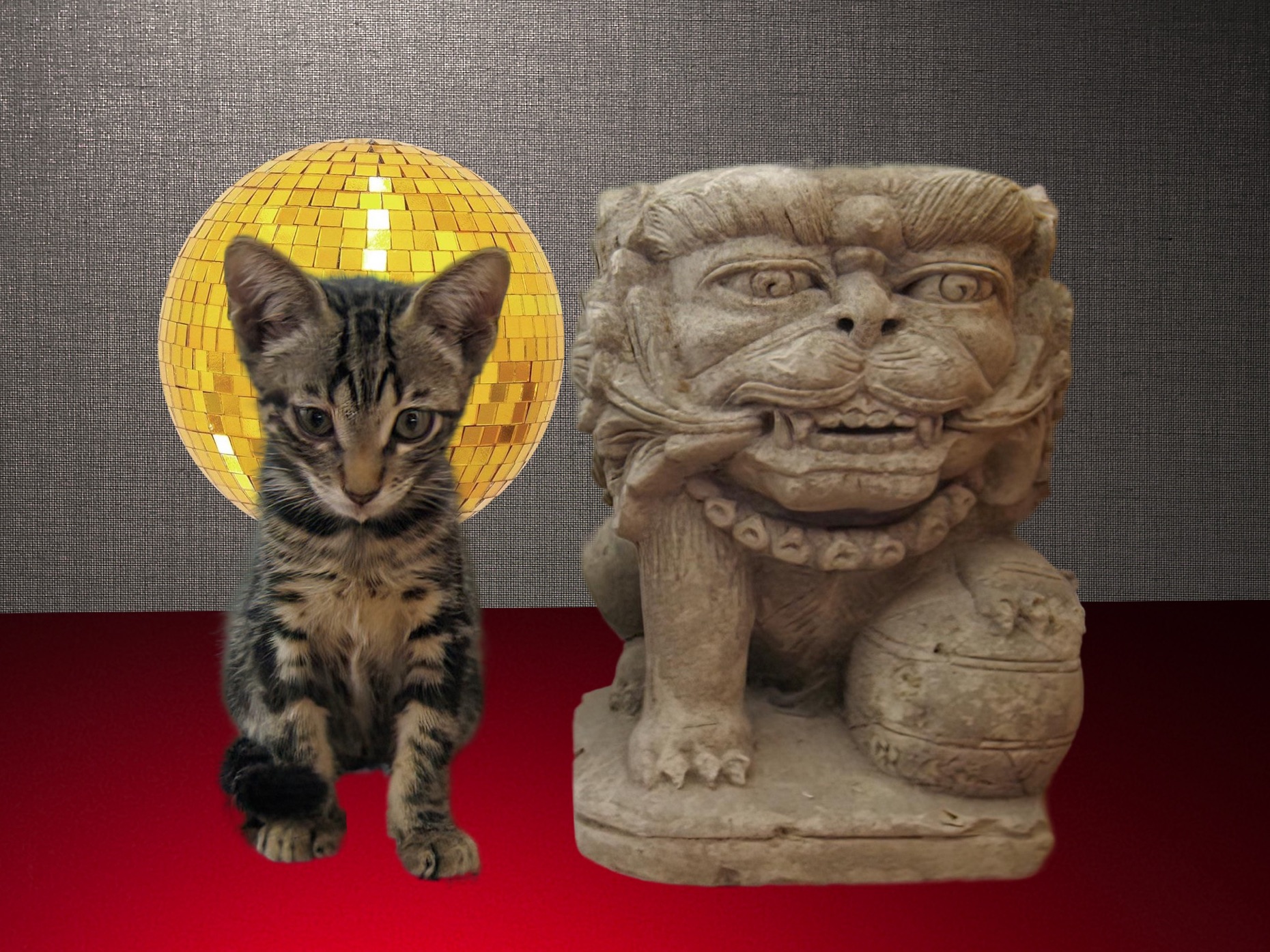Remembering Esteban
The surprisingly human companionship of a cat
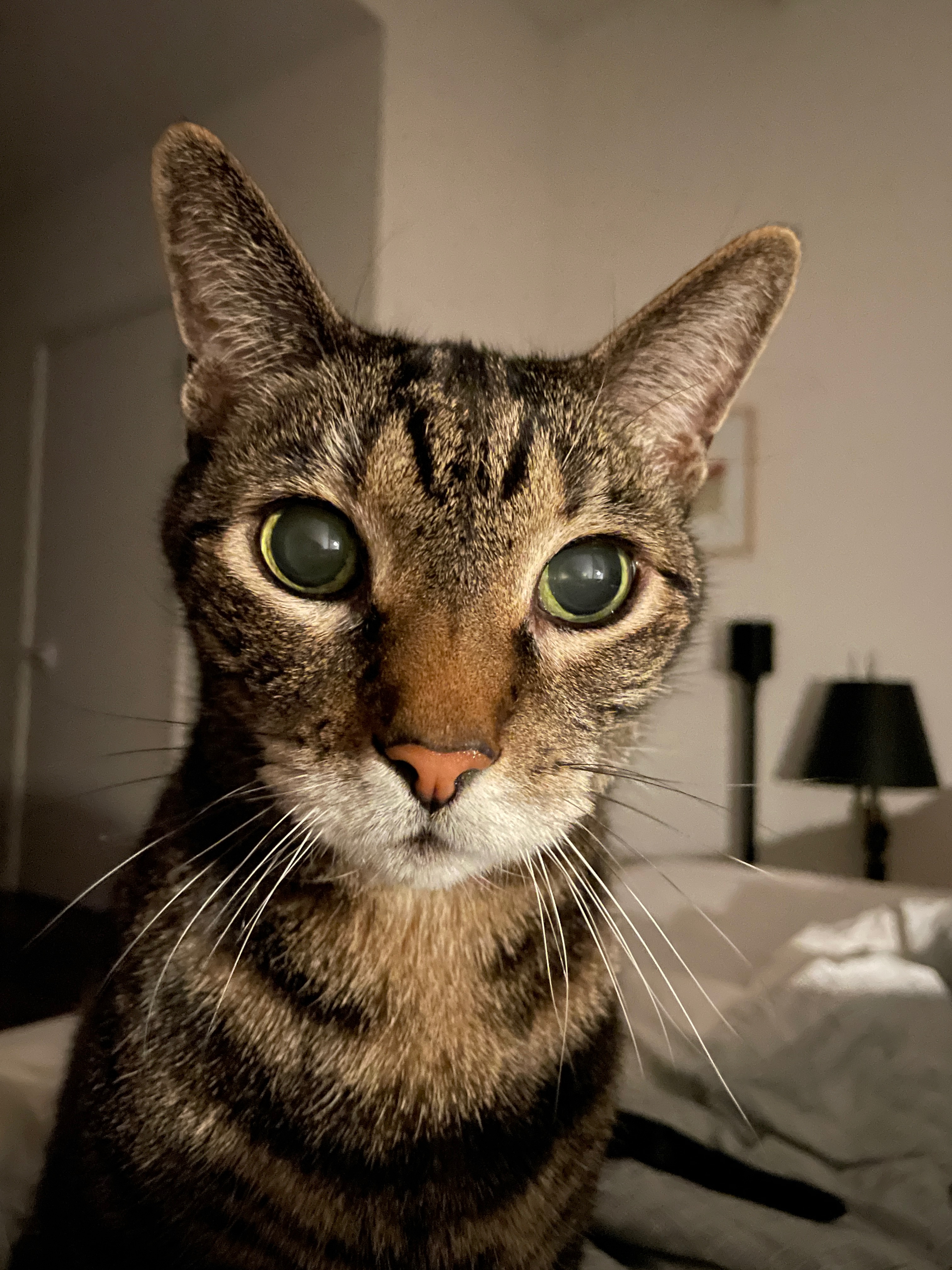
Introduction
19 years ago, my then partner declared “you need a kitten!” A few weeks later, he informed me that he had found the perfect kitten on Craigslist. So we headed from NYU’s faculty housing in the center of the Village to the guy’s home in the West Village. He had found the kitten, desperate for food and attention, in a Harlem stoop garden two nights before but wasn’t ready to commit to becoming a cat gay. Alas, the visit didn’t go well. Both kitten and I were skittish and scared of each other. After heading out empty-handed, my then partner piped up. This was a mistake, he insisted. He was ready to go back and take the kitten home with him himself. After some back and forth, we went back, took the kitten, and headed home.
As I found out the hard way years later, cat adoptions in New York City almost never are that easy. They require letters of reference, home visits, and window screens. Though as I also found out the hard way, you may be able to skip the window screens. But only if you live in a landmarked building. That’s because there is one organization that’s more powerful than the crazy cat ladies who hold a monopoly on cat adoptions in NYC. Even they bow before New York City’s Landmarks Protection Commission. Really: My adoption of Prince David had been on hold for weeks due to missing window screens. It was approved within 30 minutes after I realized that I couldn’t install them even if I wanted to (which I didn’t) and pointed out my building’s landmark status!
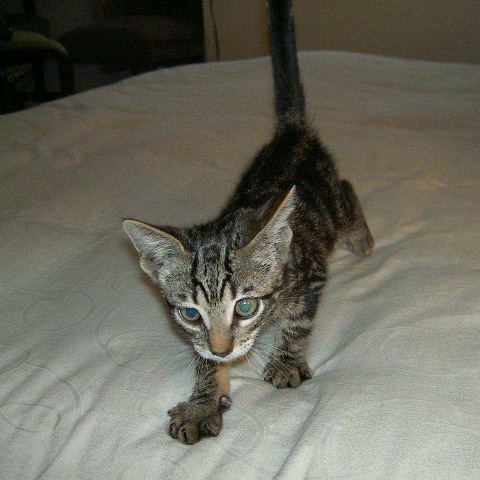
But back to that fateful day. Once home, I let the kitten loose in my bedroom and, whoosh, it vanished underneath the bed, into the corner furthest from our reach. With the space under the bed packed with boxes for computer, stereo components, lamps, and the like, the kitten had probably counted on being well out of reach. So when we just slid the mattress to the side and approached its hideaway from above, it stared at us from underneath the slats, incredulous and scared. My then partner was not impressed by its state and was about to rudely grab it and pull it out.
Recognizing just a hint of that infamous curiosity in the kitten’s demeanor, I stopped him and gave the kitten time and space to come out on its own terms. I also started whispering words of encouragement, and soon enough, the kitten did move towards us and poked its head through a gap between slats. A moment later, it pulled down again. A few moments later, it made another attempt. This time, it went up higher and stayed up longer. Then down again. Up and down. It sniffed my finger. Up and down. I got to touch it. Up and down. Until it curled up into my arm, purring up a storm. That’s how we imprinted on each other. He the love of my life, me the bitch of his life!
Days of the Kitten
The first vet visit went well. We had picked up a girl, Anyanka Mathilde Grimm — Anyanka after Buffy’s friend, a former vengeance demon, and Mathilde after my mother’s mother. The first bloodwork also went well. Much to my relief, she was free of viral nasties, including FIV. The second vet visit a few weeks later was interesting. She really was a he, the vet said, his bad. Well hello, Esteban Otto Grimm: You are named after three generations of Esteban in Pedro Almodovar’s All About My Mother—sorry for deadnaming you, Lola!—and three generations of Otto in the Grimm family, including me.
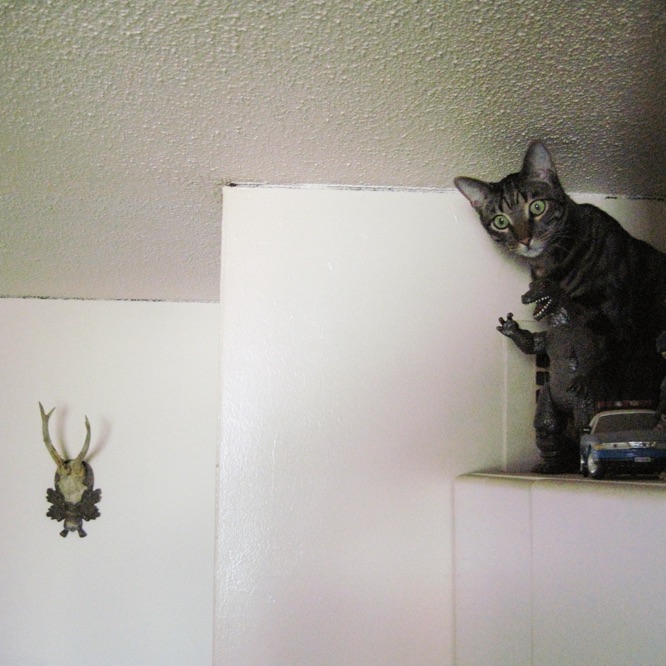
Thankfully, we live in a state where the first gender impression isn’t permanently binding and so Esteban got gender-appropriate medical treatment all his life. It matters. For instance, there is a difference of procedure between spaying and neutering. As it happens, I didn’t time that appointment quite right and Esteban went into heat the night before the neutering. Nobody got any sleep that night, what with Esteban racing through the apartment, scaling off walls, and screaming at the top of his astonishingly powerful lungs. He was so much better 24 hours later—chop, chop—without balls!
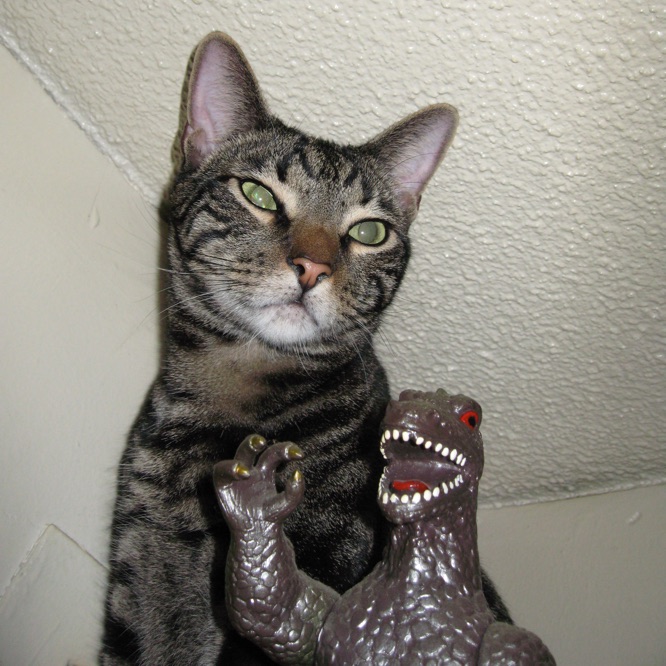
Other than that crazy night, Esteban was one cool kitten. He kept himself entertained by exploring the heights of the apartment—the climb up Mount Living Room Bookshelf ended in a book slide but the route up Mount Cupboard above the Range became part of his exercise regime. I took a jump from valley floor onto the Eastern Counter Ridge, another one onto the Fridge Summit, and then a daring jump across the entire, cavernous valley onto the Western Cupboard summit. Once up there, Esteban would position himself next to Godzilla and the two would stare down at us puny humans.
Besides climbing, Esteban also was an avid soccer player. He even invented a new variant that can be easily played by a team of one. All you need to do is bring the ball into a bath tub with the shower curtain drawn. Since that’s just how I usually leave it, Esteban would spend many a night kicking the ball up high. Thanks to the setup, the ball would always bounce right back into the tub and roll towards Esteban, who’d kick the ball again and so on, all through the night.
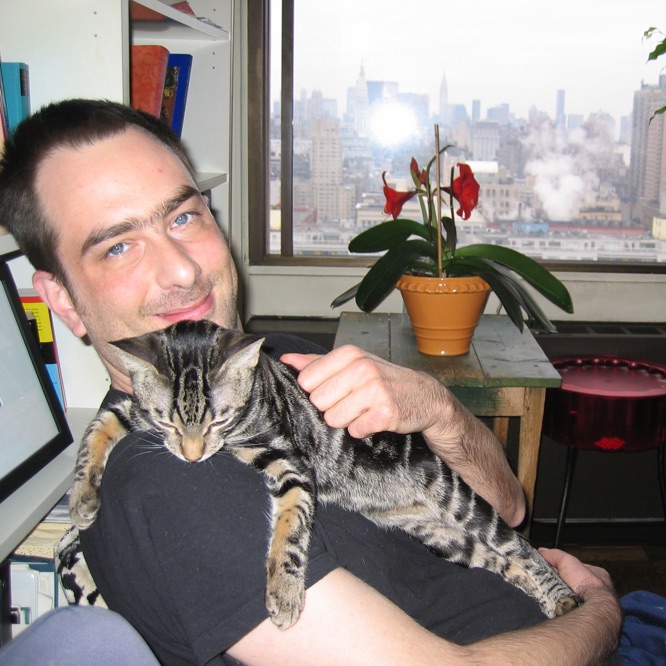
Despite his busy athletic schedule, Esteban also was an exceedingly cuddly cat. As soon as I reclined in a comfortable position in the living room, he’d come and climb up on my chest to cuddle. All I had to do was offer one arm as support and use the other to pet him. He loved every minute of it every single time, purring loudly—until he had enough, climbed down, and curled up next to me. It was during one of those cuddle sessions that I wrote a song just for him: “I love you. You love me. Let’s go outside and pee on a tree.” I still don’t understand why the song didn’t make the Billboard Hot 100 upon release!
While we never went outside and peed on a tree, Esteban and I did venture to Brooklyn together, nominally for a play date with my then partner’s cat, King Arthur. Still a kitten, Esteban was so chill that I could just take him with me, no harness, no leash, just holding him with bare hands. He savored the view from my chest while we drove over the Brooklyn Bridge and, a little later, he thoroughly explored every nook and cranny of my then partner’s studio. In fact, he was so focused on exploring, he completely ignored the purpose of the visit, playing with King. I guess it didn’t help that King kept following Esteban at some distance, hissing nonstop.
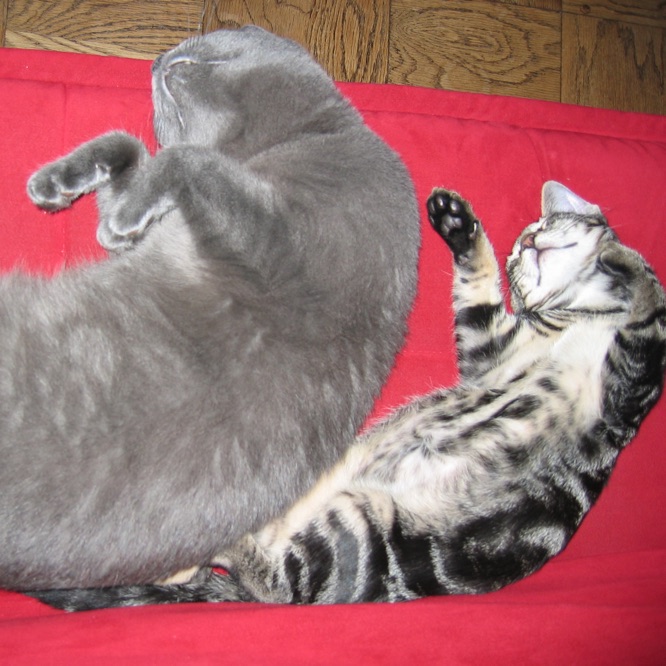
The play date for King at my place a few weeks later wasn’t much of a play date either. King took one look at the unfamiliar surroundings and vanished underneath the sofa. Neither words, treats, arms, or broom stick could convince King to come out again. He stayed put underneath the sofa—until about 24 hours later, when he emerged and acted like he had always lived there. That way, King moved in with me months before my then partner. Those disastrous play dates notwithstanding, King and Esteban became inseparable. They played together. They ate together. They slept together. They founded the Feline Liberation Front (FLF) together. I’m still a bit unclear about the FLF’s goals and activities. But people in the know tell me that the State Department came rather close to officially designating the Feline Liberation Front as a terrorist organization. Something about feline supremacy and infecting every human with toxoplasmosis gondii to make us more beholden to cats.
Frankly, I find that a bit hard to believe. While King was not averse to utilizing biological weapons when it suited him, Esteban was a people person, ahem, cat. The only thing Esteban ever attacked during his lifetime were those boxes underneath the bed. We heard him tear through them at night. But I didn’t think much of it because there was no visible damage. At least, as far as I could tell, peaking under the bed from the side. Hah! When I needed them for my move to Brooklyn, I realized that all that was left were the visible parts, towards the side. He had completely shredded the rest, leaving just a pile of scraps.
Esteban, Community Organizer
Esteban discovered his love for human attention when I extended our daily fetch sessions to the hallway outside the apartment. It all came together rather organically. Throwing the ball far enough meant throwing the ball from living room through hallway or kitchen (which really was a second hallway next to the actual hallway) into the entrance area and then back again. Well, at some point, I just opened the apartment door and started throwing the ball out into the building hallway. The boys loved it. They loved it even more when I started staging laser shows in the hallway.
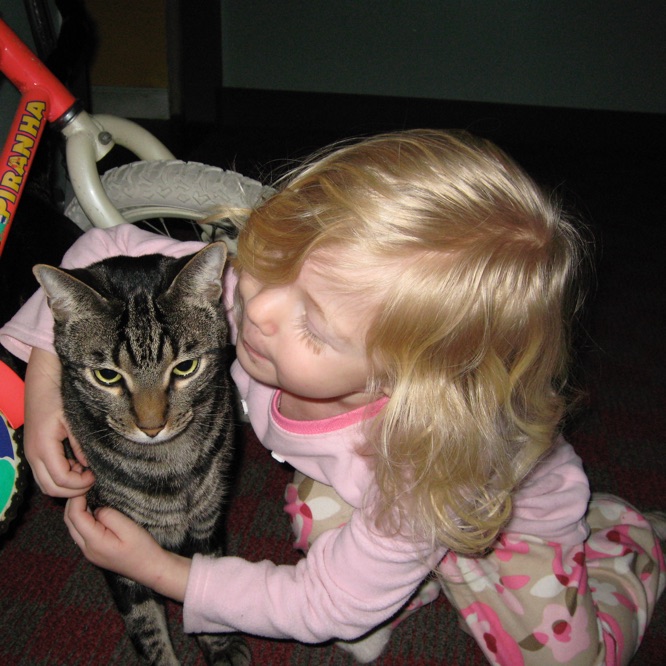
Pretty soon, the neighbors got curious about the racket outside their apartment doors. And once they saw what was going on, they called their children and those youngins were plainly ecstatic about cats, real live cats being right there in the hallway. Of course, they wanted to play with them. Esteban loved it. He basked in all the attention and easily forgave when the youngest of the youngins didn’t quite know what “gentle” meant at first. In stark contrast, King thought them all too much. At the first hint of another door opening, he’d bolt back into the apartment and observe the ensuing dance of the baby banshees from just far enough so that he could see everything while still being just outside people’s reach.
Esteban was only getting started. He really came into his own after we moved to Brooklyn to our own place at One Hanson Place—except with New York City real estate being NYC real estate, it’s really only 0.3% of that place. Well before that move, my then partner had also moved into my old apartment and it was truly great until it wasn’t anymore. So the move to Brooklyn also was a separation. In a textbook case of hoisting with his own petard, my former partner’s attempt at claiming Esteban for himself by declaring that “The cats must not be separated!” resulted in King also moving with Esteban and me. Esteban took to the new apartment and of course the hallway outside in no time.
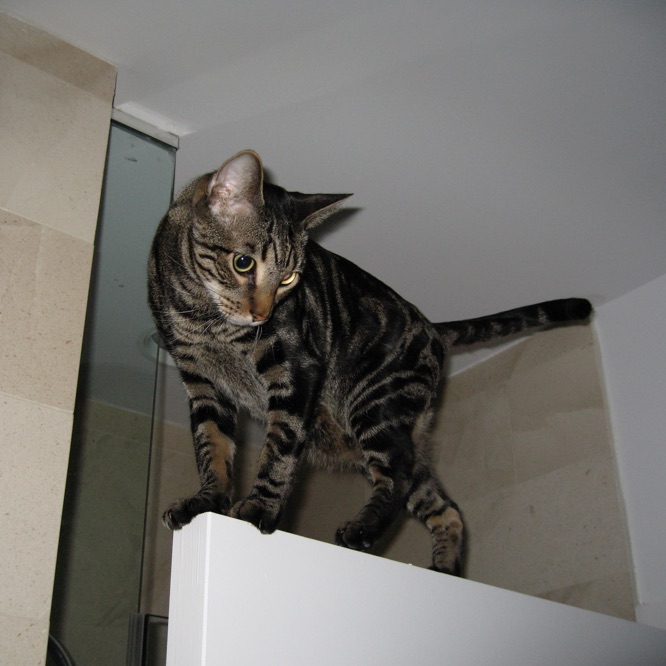
For the first several years after we moved into the newly renovated building, the 15th floor differed from other floors in that we neighbors living on the same floor formed a real community. It sure helped that two more units were also owned by gay men. But more than anyone and anything, the one who created that community, who introduced everyone to each other, and who insisted that everyone be a part was Esteban. He quickly picked up if the owner was allergic or shared their premises with a dog, giving them their space. But everyone else was fair game and, if the door was open, their apartment too. He’d visit. He’d explore. He’d chill. And he’d exercise—by seeking out the highest accessible place, usually the top of a door, all 2.5cm or 1inch of thickness, a feat he not only pulled off repeatedly at my place but also in 15D.
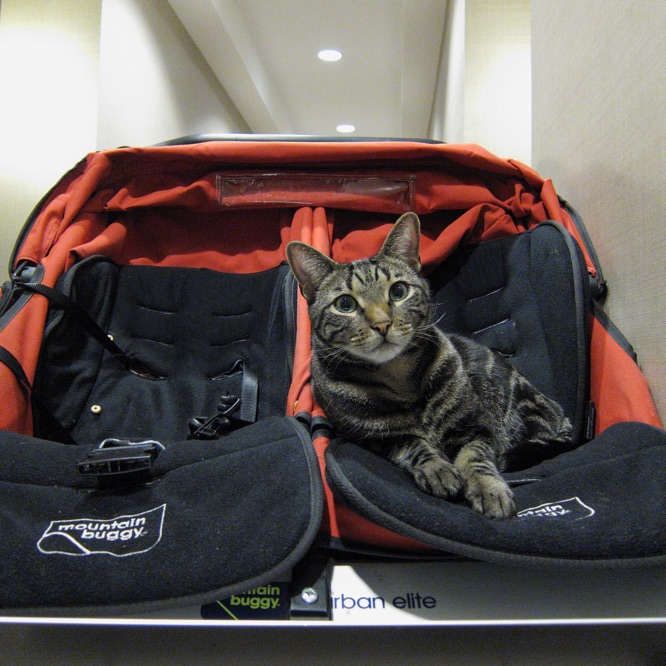
Esteban was particularly fond of 15K, then occupied by a lovely couple and their twin sons. For years, while the twins’ pram was parked in the hallway next to their door, it served as Esteban’s base of operations, where he’d hang out and also sleep. When their apartment door was open, he’d stroll right in and head to the twins’ bedroom, making himself comfortable under, behind, or in one of their beds. King didn’t change his mind about building hallways and never ventured far from the door—except that one time when he too came to visit 15D and, while the humans were busy talking, proceeded to pee all over Malik’s pile of dirty workout clothes—as a laughing Malik told me over the phone a few minutes after we had left.
Over the years, the owners of 15D and 15K unfortunately moved on, but that didn’t impress Esteban. He continued to consider the apartments very much part of his domain. Malik tells of a contractor who called somewhat frantically because a cat had just walked into the apartment and ignored the contractor’s attempts at shooing it out again. Malik advised the contractor to just let him be; he would leave when he had enough, which is just what he did. After Malik sold, I met the new owners standing outside their apartment, facing the door and not knowing what to do because between them and the door was Esteban, patiently waiting for them to finally open the door. He clearly felt that this was the thing to do, so he wasn’t so happy about me scooping him up. But by then, he had already achieved what he always does: We were introducing each other.
Another time, I was rushing to get ready for a meeting and made sure David, who had opened the apartment door again, was back inside before locking the door. Since I didn’t see Esteban, I just assumed he was inside. Three hours later, the doorman called to notify me of my cat having found refuge in my neighbors’ apartment. Assuming he meant the young escape artist, I assured him that said cat had long ago returned home. When I finally thought to check on Esteban, he was nowhere to be found. He wasn't in the hallway either, but the door to 15C was propped open. In the apartment, I found two very amused tenants who had been watching Esteban thoroughly explore their apartment from floor to reachable tables, counters, and shelves. Apparently, I overlooked him in my rush and he just meowed at doors until somebody took him in.
The Great Chase
Quite a bit weirder was what happened in the hallway one late evening in 2021. In fact, it was so weird, the story is best told in reverse, from its ending. For the grand finale, Esteban was trotting down the hallway, loudly battle-yodeling—imagine a feline take on the ululating war cry from Hollywood Westerns or Leon Thomas’ inspired jazz yodeling delivered in a rhythmic staccato—and chasing a family of four, who were genuinely terrified of him, trying hard to make into their apartment before he got there.
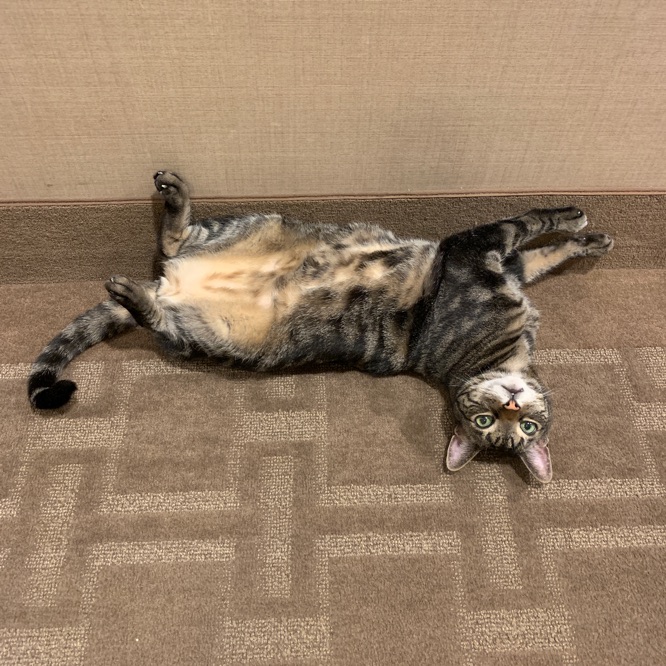
Moments before that unlikely chase, I had been sitting on the floor outside my apartment, face mask on, reading and listening to music on my noise-cancelling headphones. The cats were roaming about the hallway. When I noticed some movement to my right, I was a bit slow to react because apartments and passenger elevators are in the other direction and I hadn’t seen anyone head down to the laundry room. When I did turn, I found the entire family by then living in 15K, frozen mid-step, staring at me with obvious alarm. Quite clearly, they had taken the scenic route up, using the service elevator, to minimize the likelihood of neighborly contact and had counted on no one being in the hallway thanks to the late hour. They also were not receptive to my gestured invitation to just keep walking by. I had to get up and go inside my apartment before they would pass. When I noticed that Esteban, unlike David, hadn’t come back inside, I stepped outside again and found the Great Chase well under way, with that family fleeing from a house cat as if he was an apex predator ten times his size.
Good boy!—I didn’t say that. But I certainly thought it. And I can’t claim that I was in any hurry to intervene.
As to Esteban, his battle-yodeling was reserved for situations when he was worked up and going somewhere. That is consistent with him heading towards one of his favorite haunts, 15K. It also is consistent with him chasing the parents out of spite, for revenge. That’s because this is not the first time they have been unduly paranoid about infectious diseases. And that first time, they took it out on him. Right after moving in, they introduced themselves by complaining about the cats’ presence in the hallway in general and Esteban’s attempts at entering their apartment specifically. As justification, they uttered some nonsense about her being pregnant and trying hard not to get infected with toxoplasmosis.
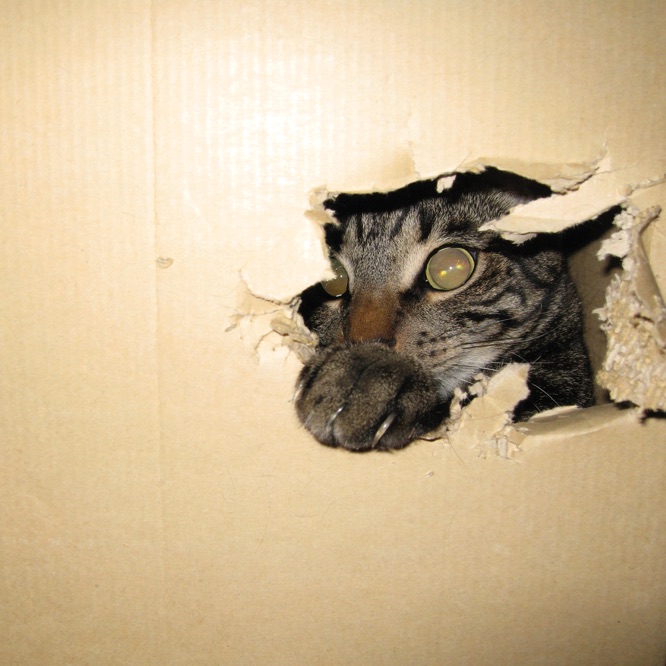
Never mind that it is rather presumptuous—and mighty rude—to just treat my cats as diseased. Also, only recent infections with toxoplasmosis put a baby at risk and those won’t be found in indoor cats. Even free range cats mostly pose an indirect danger. You’ll have to handle days-old poop and ingest some of it as well to actually be at risk of infection. However, before you claim that you’d never do that, consider whether you ever played in a sandbox. No wonder that about a quarter of Americans are already infected with that parasite. Still, I ignored their paranoid imposition and, to keep the neighborly peace, mostly curtailed hallway time from then on out, much to Esteban’s dismay. It took him months to give up on trying to leave with me every time I headed for the door.
By the time of the Chase, I had somewhat relented in my enforcement for two reasons: First, Prince David, King’s successor in the royal household and evil genius, had taught himself how to open the rather heavy steel apartment door and had been heading into the hallway more or less at will. It took Esteban a while to notice what David had been up to. But once he did, Esteban reliably followed in David’s wake. With both cats so clearly enjoying their hallway adventures and Esteban immediately taking up his old routine of patrolling the entire length of the corridor again, I didn’t want to deprive them of that experience.
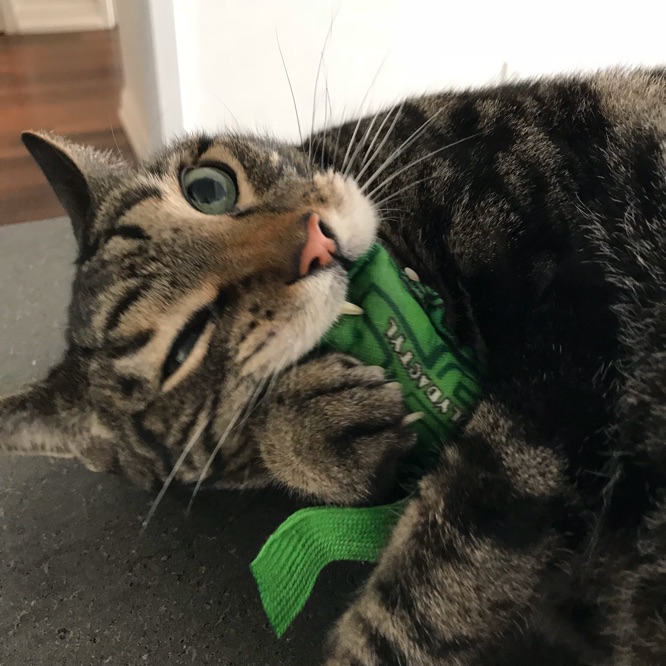
Second, the family in 15K had taken to the Covid pandemic by taking out their paranoia on their neighbors again. Not only were they refusing to share the elevator—no matter that everyone was masked—but they also made other people wait. After being at the receiving end of this equally entitled and unhinged behavior a couple of times, I couldn’t be bothered to take their needs into account anymore. While I avoided hallway time during days and early evenings, late evenings and night time were fair game. That’s just why I was sitting on the floor outside my apartment while Esteban and David were roaming about in the hallway that night.
In other words, Esteban not only had good reason to hold a grudge against the parents, with them all turning up in the hallway, he also had the perfect opportunity to turn their paranoia against themselves. Even if he didn’t intend to, he played the situation beautifully. His battle-yodeling was a particularly fine touch: As they were nervously fumbling with keys, he provided constant reminder that he was getting closer and closer. He might have succeeded getting into the apartment, but I reached him before that eventuality did occur and brought him back to the area outside my door. He stayed there for a while. But when the father walked past again on his way to the service elevator, Esteban resumed his chase, this time in the other direction….
As my gleeful tone makes ample clear, I much enjoyed the Great Chase, I enjoy telling its tale, and I feel zero guilt or shame for that. It’s the best kind of Schadenfreude because that family inflicted all the mid-motion freezing, the stressing and panicking, the frightful rushing from a household cat to themselves. At the same time, they have all they need to cope differently within easy reach. He earns his living as a psychiatrist. So he should have knowledge and skills to develop a more reasoned and reasonable approach to coping with disease. But instead they take it out on others. Having said that, I do feel sorry for the children. With overprotective parents like that, their pandemic experience must have been an even more claustrophobic hell than it was for most of us.
The family has since moved to the suburbs. I hope that gives the children opportunity and space for finding their own way, far from the clutches of those parents. However, even though the tenants of 15K have changed, the cat predicament hasn’t and they still can’t roam at will. In my first conversation with the new tenants, a young straight couple, she impressed on me the severity of her cat allergies. Ok. I heard her. We know the drill. I cut down on hallway time and made sure there are no more breakouts during days and evenings. But then two weeks later, when I see her and greet her, she responds with a cheerful “Where are the cats?”—uhm what? So is she severely allergic or not? I’m getting mixed signals here. But I also don’t care to find out more. We have kept our distance since that interaction and I’ll be minimizing all contact until one of us moves out.
Even weirder, I have encountered the opposite behavior as well. A guest with an acknowledged cat allergy was developing obvious signs of respiratory discomfort but insisted on staying put. I had to tell him “You have to leave. Now! ” I may have threatened him with calling an ambulance as well. Why would anyone put themselves through that? I don’t even want to watch a similar occurrence again. For that reason, I now stock allergy medication. It made a difference once already. Still, I’m puzzled by people exaggerating or trivializing their allergies. It serves no one, including themselves, and by putting other people in distinctly uncomfortable or untenable situations such behavior is bound to backfire.
The Troubles
I’ve gotten pretty far ahead of Esteban’s story. Let’s return, for now, to the days when King Arthur was still heading the royal household. Just like the relationship between me and my former partner, Esteban’s and King’s relationship was truly great until it wasn’t anymore. The Troubles started one dark and stormy night. I was busy with a friend in the other bedroom and heard them make a racket for a short while. But that wasn’t that unusual and, as I said, I was preoccupied. I still have no idea what set them off that night. The vet’s theory is that King freaked out because of the thunderstorm and blamed Esteban for all that thunder and lightning right outside the window.
Be that as may. Fact is that I found King in the bathroom in the morning, trembling and peeing on himself (even though the litter box was barely a foot away). He was that upset and only relaxed a bit after the vet gave him a valium. From that day on, if Esteban came even remotely close to King, even when each cat was in their own cage, King would flip out, growling and hissing nonstop. As you can probably guess, Esteban wasn’t particularly impressed. But he wasn’t particularly friendly either, getting ready to pounce instead.
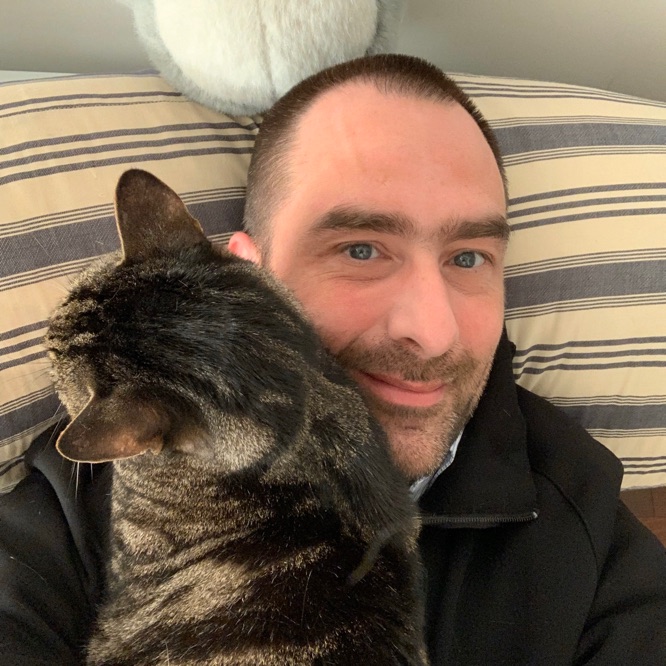
With the Troubles thusly in their hot phase, I had little choice but to split the apartment into two. Taking King’s far more fragile constitution into account, my bedroom became King’s domain and the rest of the apartment Esteban’s. I did make a point to spend as much time with Esteban as I could. Still, he was heartbroken about being locked out from the bedroom and spent hours howling outside the door. It was horrible. But there was little I could do. I did try to find King a new home but no one was interested in adopting a middle-aged cat with a taste for biological warfare. And so the cold phase of the Troubles became routine.
After many months of this, Esteban and King—thankfully—showed signs that rapprochement might be possible. When I was a bit slow to close the bedroom door again, they’d both come up, sniff each other, and were decidedly ok with each other. After allowing for more of these short encounters and them behaving similarly, I tried some closely supervised play sessions and, when they too went well, increasingly left the door open—as long as I was home. Before long, I relented even on that, starting with short trips to the store before leaving them alone for hours. After maybe two years total, it seemed that the Troubles were finally over again.
Well, kind of. King and Esteban never recovered the closeness they once shared. And while they did share the bed with me at night again, I served a role not unlike the Berlin Wall as a strict and rather arbitrary border. Esteban slept on my left side and King slept on my right side. Neither would dare climb over the wall at night, though King usually came to his resting place via the territory of the class enemy. Since neither cat was averse to sitting on my chest, said wall might function as joint security area as well. Frankly, the wall enjoyed this dual purpose role.
End Times, or the Solace of Music
Alas, my relief about the restoration of feline cohabitation soon gave way to a depression that was so all-encompassing and deep, I came far too close to ending myself. The primary trigger was medication I had been taking without issues for many years, so neither my doctor nor myself were watching out for signs of this known side effect, at least not anymore. By October 2017, I was so far gone, I didn’t have the wherewithal to seek help despite knowing full well how bad I was. All I could do is try to keep on going.
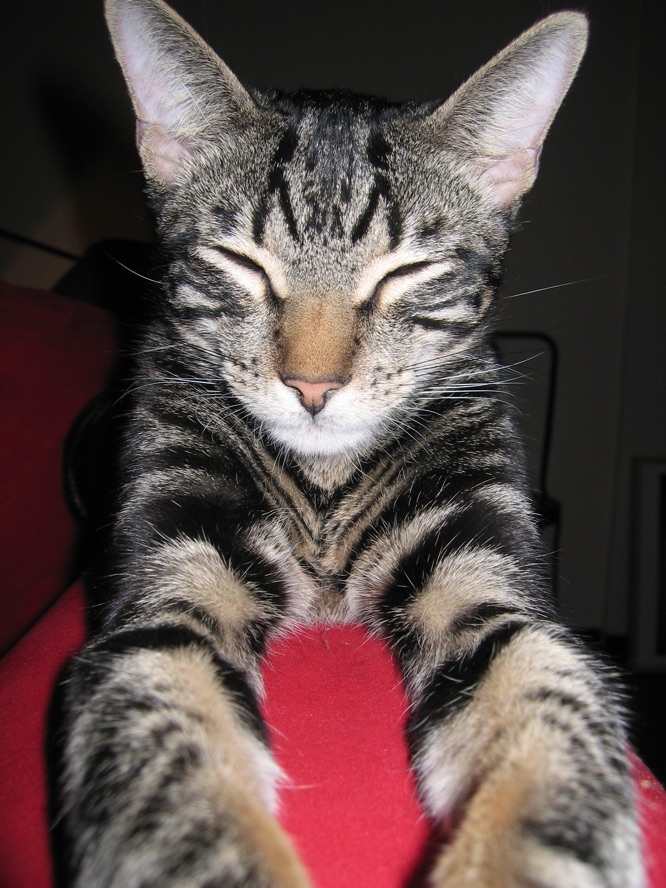
I held onto life thanks largely to the cats and Facebook (really!). The cats were providing physical presence and constancy, whereas Facebook provided a readily accessible forum for sharing my writing. And I was writing, writing about anything and everything, writing like my life depended on it. That’s how I discovered I could write. Alas, it was a nurse practitioner in my doctor’s office who saved my life. We had previously bonded over a moment of somewhat inappropriate bedside manner that left us both laughing long and hard. So during a routine phone call, Abby picked up on me not being right, asked pointed questions, and helped me make urgently needed changes that same day. Thank you, Abby!
Those changes, of course, included taking me off that medication. The impact wasn’t immediate. My body took two days to flush most of the stuff out of my system. Hence during the afternoon of the second day, in the course of just a couple of hours, I could feel the depression lifting from me. It was as if an all-encompassing, entirely black, heavy felt that had been dulling and dampening all sensation was slowly but definitely dissolving. When it was done, by the end of the afternoon, I wasn’t just feeling better, lighter, I was dancing on the street. Really!
Despite the outcome, the experience of that drug losing its hold on my affect was one of the more unsettling and traumatic experiences of my life. No thank you! Worse is the knowledge that the pharmaceutical company making that drug held back more effective and less toxic alternatives for years, so that it could maximize its stranglehold on the US market for even longer. Furthermore, it ruthlessly exploits that leverage by charging over three times more than it does in other Western countries, notably Europe.
As I was slowly recovering over the next few months, King was rapidly declining. By February 2018, any hope that he might recover again was vanishing, just as his body was increasingly vanishing as well. After consulting with friends on Facebook and listening to their stories about last days spent with their old and sick cats and dogs, I made the heart-wrenching call to ease King’s journey to the Great Catnip Fields. Sparing King a stressful trip out of the house, the then owner of my vet practice agreed to come to my place on Monday, February 19, 2018 a little after 6pm.
I wrote the previous paragraph on the subway, without referencing notes or some such. Yet I don’t remember dates, at all. There’s only three I can tell you off the top of my head: My own birthday (which would be hard to forget), my sister’s birthday (which conveniently happened two years minus one week later), and my closest friend’s birthday (which conveniently coincides with the United States gaining independence, by day of year only). That King’s date of passing now is the fourth tells you something about its impact.
Knowing that King harbored a deep love for string music, I spent the weekend buying and setting up speakers for the main bedroom and making a playlist that focuses on the revelatory and sacred:
- Terry Riley’s One Earth, One People, One Love, performed by Kronos Quartet and featuring astronaut Gene Cernan reflecting on seeing Earth from above.
- Ladilikan, a song by the griot, that is, praise singers Trio Da Kali from Mali with support by Kronos Quartet.
- Philip Glass’ opera Satyagraha about Mahatma Gandhi, sung in Sanskrit.
- Giovanni Battista Pergolesi’s Stabat Mater, a hymn to Our Mother of Sorrows in twelve movements, sung in Latin and written on his deathbed.
- A selection of my favorite pieces by Meredith Monk, mostly sung without words, including Björk’s take on Gotham Lullaby from 2005.
- Terry Riley’s One Earth, One People, One Love as an encore.
Out of these stand-out pieces, Björk’s performance is particularly dear to me. It is both a faithful recreation of Meredith’s original and Björk’s own unique interpretation. It also happens to be a recording of Björk’s only public performance in 2005. Finally, if you listen carefully, you can clearly discern yours truly’s delighted whoops amongst the applause afterwards. Admittedly, it did help that I was sitting in first row center a mere 2m or 6ft from Björk. Alas, I categorically deny the rumor that Carnegie Hall has a pristine, high fidelity recording of all four hours of Making Music: Meredith Monk. Why would they organize such an amazing event, record every minute of it with studio-quality recording equipment, and then just keep those recordings to themselves?
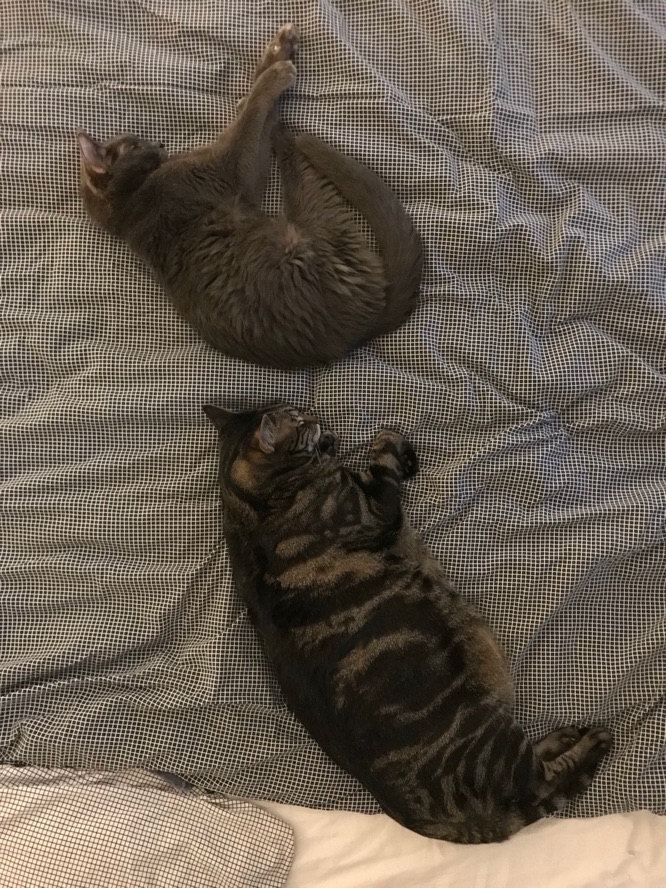
King and Esteban loved it. They had forgotten all about the Troubles and spent the day curled up next to each other, and me, on the same side of the bed. Sure, each of us got up to eat or go for a bathroom break once in a while. But just like Making Music at Carnegie Hall kept on going for four hours without interruption or break, we kept on going, fully immersed in some of the most beautiful music wo·man ever created for most of the day. The previous days had been rough for King, full of discomfort and pain. He spent much of them under the bed and on the cool bathroom counter. But Monday was different: King stayed with us all day and cherished every minute of it. Shortly after the last sounds of Terry Riley's encore had played, with all three of us still in a trance, Dr Farmer arrived. King didn’t even get up and passed peacefully right there, on our bed.
Feline Behavior
King’s death hit Esteban and me hard. We both were grieving for months. But it also brought us closer. Starting around that time, Esteban would hardly part from my side anymore, regularly following me even to the bathroom. When I was worked at my desk, Esteban would join me, sleeping right next to me—or at least be close-by, on our bed. For hours, he’d hold onto my left hand, one paw holding on from below and one paw holding on from atop, with his head resting on my hand. It didn’t bother him that I was moving my hand while typing. And it didn’t bother my left wrist that there was noticeable weight pushing down on it while typing. When we snuggled, it was mostly in bed. That’s also where I noticed that I was developing distinctly feline behavior patterns, turning my head away from him and nestling it between arms. He loved that and, loudly purring, would insert his paws between my arms and join me in a close snuggle.
When we humans face each other directly and distort our faces, eyes wide and teeth baring, we usually call that a happy smile. When we also open our arms wide, we consider that especially welcoming, a gesture usually reserved only for our closest friends and family (and also comrades for those of us who haven’t given up on wo·man deserving better than eternal, individualized struggle). It also serves as overture to getting physically closer and wrapping our arms around each other. Cats don’t work that way. Quite the opposite: Full frontal faces with bared teeth are a sign of violent aggression. Now, the vast majority of cats cohabitating with humans, Esteban amongst them, learn to live with us behaving like we are all nuts, totally nuts. But that doesn’t mean they like it. And in moments like these, I was meeting Esteban on his terms, one cat to another, ready to snuggle. He loved it. Every single time.
That also explains that one time during a board meeting of the House Foundation at my place, when Esteban strolled past the dozen or so people seated around my living room table and jumped straight onto Meredith Monk’s lap—even though she was the only person in the room severely allergic to cats and the least welcoming. That is, to a human, her body language signaled apprehension, possibly even dismay. To Esteban, she clearly was the least threatening and probably the most excited to snuggle. So he jumped. Oops! By the time I got back from picking up dinner for everyone, Meredith was gone, chased away by Esteban. Thusly ended my time serving on that board. Nonetheless, Esteban can lay claim to having sat on Meredith Monk’s lap, if only for a short moment. He was that special!
A Blight on Humanity
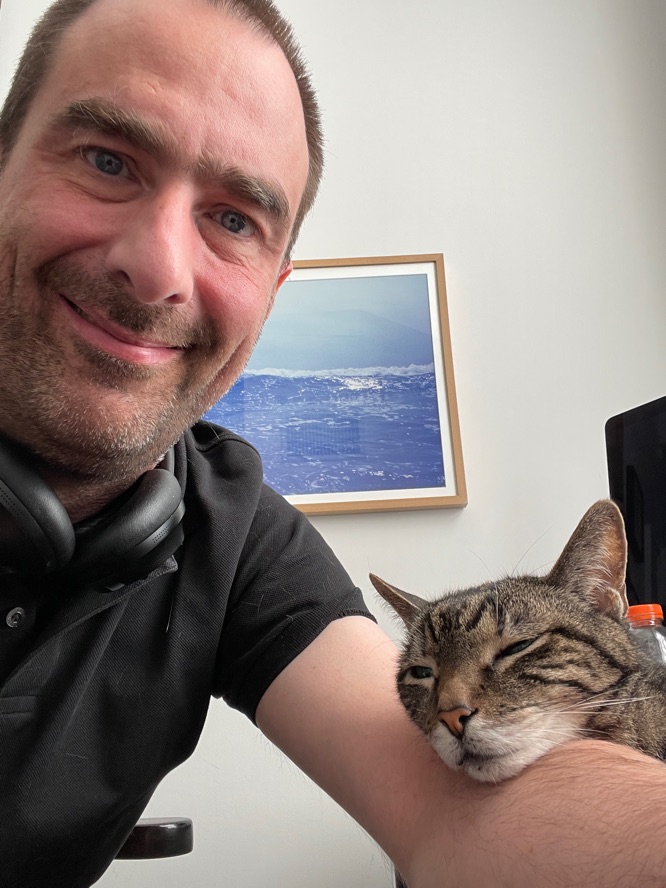
Meanwhile, my life was to become even more unsettled than it already was. Leaving academia for industry four years before King’s death has been very much double-edged as far as life-altering decisions go. I’ve learned a lot and contributed to some really cool software systems. I’ve also experienced astounding incompetence, often lurking behind cargo-cultish adherence to the status quo, and far too much deeply problematic as well as clearly unethical behavior. As far as the latter is concerned, my year working for Facebook marks an astounding low. It’s not that I didn’t know I was walking into a shit show. News about Cambridge Analytica had broken just a couple of months before. But my positive experience with the social network at one of the low points of my life created considerable good will on my part and exploratory conversations with people at the firm left an impression of genuine commitment to do better. Notably, I came in hot to a conversation with a firm VP and it still was very productive, even lasting double the allotted time.
Alas, as became obvious over my year of working there, Facebook is less a corporation operating in a democracy than the contemporary successor to East Germany’s Stasi run for profit as a social impact cult. The cult part was obvious from the first day. It triggered me into keeping my distance from the indigenous population and treating my work as a period of intense anthropological observation. It largely provided the raw material for my invited talk about the firm at a major academic conference in 2020.
The violative parts weren’t quite so obvious. The New York Times helped bring some of them to light during my employment and thereby hastened my exit a year after signing on. Particularly galling was Sheryl Sandberg’s smear campaign of Facebook-financed editorials against George Soros. When my observation that Facebook bans users engaging in such inauthentic coordinated activity was read but otherwise ignored by her team, I took to stating “I blame George Soros” in discussions about things that had gone wrong at work.
Particularly devastating was Facebook’s enabling role in the genocide against the Rohingya in Myanmar. Amazingly, the firm managed to repeat that feat two years later, facilitating another genocide, this time in Ethiopia’s Tigray region. Facebook’s role in both was entirely avoidable and a direct result of the firm’s aggressive pursuit of growth, with zero consideration given to actual social impact. The bottom line is that real communities thriving on the social network cannot compensate for the fact that Facebook is a blight on humanity and that all its employees, particularly executives have blood on their hands. Its continued existence points to an inhuman hollowness of capitalism à l’américaine. It also raises grave doubts about this country’s actual commitment to human rights.
Unfortunately, Facebook consumed much of my attention for years after I quit working there due to the serendipitous discovery of compelling evidence that the firm was defrauding customers, investors, and regulators alike by artificially inflating the most fundamental advertising metric, ad impressions. Mind you, I had some fascinating conversations with reporters at The New York Times, several partners of a tier-2 law firm specializing in regulatory enforcement (which happens to represent Rupert Murdoch and Fox), and the Federal Trade Commission (FTC). Yet those same conversations also were singularly frustrating. The bits that the Times and law firm shared with me after due diligence were denials from institutional advertisers that anything might be amiss; the FTC didn’t even bother with that courtesy. All the same, I not only had the receipts but also independent confirmation from another industry insider.
Working out that apparent contradiction took a while. I tell the full story in another blog post. It boils down to institutional advertisers having their own data feeds that bypass significant parts of Facebook’s advertising platform, something my manager had emphasized again and again while I worked there. That limits the defrauded to individuals and small businesses mostly. Apparently, they lack the clout for making Times, law firm, and FTC spring into action. As this episode vividly illustrates, the trope of self-serving and corrupt elites so often invoked by right-wing populists is firmly grounded in manifest reality. Alas, their reaction to that observation, trying to blame migrants, Black and Brown people, and the LGBT community, is utterly depraved and puts them firmly into the “most likely to commit genocide” fringe of humanity. Yet despite their shared primary interests, right-wing populists don’t seem to like Facebook. Go figure!
Royal Renewal
I had been so repulsed by Facebook’s total lack of ethics, I simply stopped going to work. When after three weeks nobody had inquired about my whereabouts, I ventured to the office one last time and handed in my resignation. I even came up with a slogan cum logo for the occasion: “So long, and thanks for all the gelato!” The gelato really was an exceptional perk. A dozen flavors freshly made by artisans every day. A rotating selection every week. It was simply spectacular. It also was the primary reason I didn’t quit earlier. I’m guessing it made a three-month difference in me working for the firm.
Funnily enough, right after I handed in my resignation, my adoption of Prince David, after languishing in limbo for weeks, was approved after all. I had first heard about a special kitten from my friend Stephanie after she gave him his first shots. His foster mom had picked up on Esteban and me being rather melancholy during her home visit and, realizing she had just the kitten to stir shit up, was super-supportive as well.
Still, the adoption wouldn’t have gone through without the Landmarks Preservation Commission. In a case of obvious clairvoyance, they had declared the outside facade of my home one of those landmarkajigs in 1977, a perfect 42 years before that designation resolved an impasse about window screens, or the lack thereof, during my adoption of Prince David. The crazy cat ladies holding the monopoly on cat adoptions in the city wisely defer to that singular commission as the one exception to their rules. But please don’t mock them for it. Making an exception can’t be easy for people who are so unyielding in their rule enforcement they make German government bureaucrats weep with joy at having found their soulmates. In other words, as a German and cat lover, I get them. Even when they occasionally make my life harder than need be.
With the renewal of the royal household thusly secured, I brought the royal maniac—Esteban’s nickname for David—home with me the weekend of Gay Pride 2019. I had selected his proper name in memory of Prince and David Bowie. Channeling his royal predecessor, David too immediately vanished under the sofa and didn’t emerge again until the next day. Similarly, he made the hallway closet one of his favorite hideouts. Several large, bubble-wrapped frames form a padded ledge behind the coats. It had been King Arthur’s favorite hideout and it is a favorite of Prince David’s too. Alas, to fully claim the mantle of rulership, David still needs to join the royal sleephold (not sleeper hold) and, so far, his attendance record has been spotty. Alas, he seems to have belatedly realized that he is in clear violation of the compact establishing the royal line and finally began making an effort over the last couple of weeks—after years in the royal household and 1.5 months after Esteban’s death.
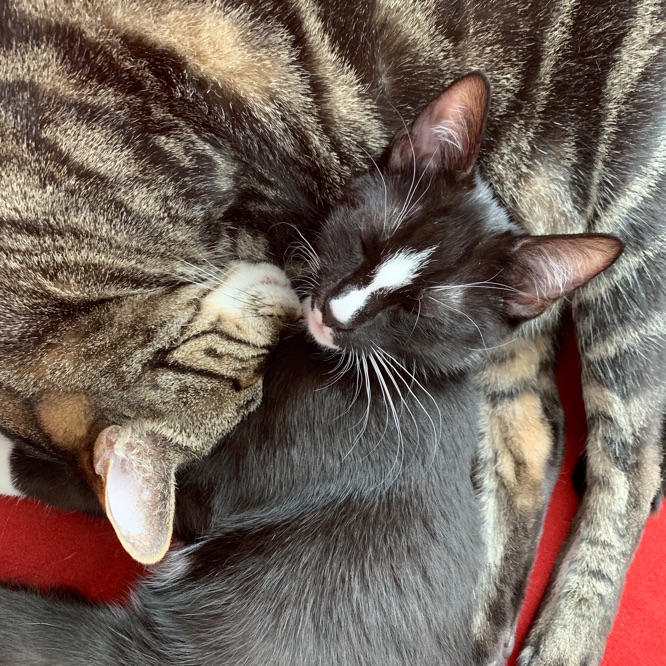
Esteban—if you remember the cat this remembrance is about when I am not decrying Facebook’s duplicitous conduct and genocidal impact—had distinctly ambivalent feelings about the royal renewal until that final day. Sure, it made for a more lively household while also bringing opportunities for curling up into or next to another feline. But Prince David is the feline equivalent of a bro. He gets off on pointless displays of cattility, like racing the apartment from one end to another, jumping up along door frames, or relentlessly pursuing aging feline supermodels who have the great misfortune of living in the same environs. In other words, David, like most bros, just doesn’t know when to stop.
As told by Esteban, aging feline supermodel, the royal renewal has made the journey from sleeping quarters in the royal sleephold to dining hall singularly treacherous. The door of linens used to be nicely shut and serve as one of the landmarks when crossing the canyon of closets. Nowadays, however, the door of linen is open more often than not. Not only does this obstruct the journey, but hidden inside may just lurk the royal maniac. So Esteban approaches gingerly and peeks around the open door. On a good day, the royal maniac is busy elsewhere and, once Esteban finished crossing the canyon of closets, it is an easy jaunt to a nice, relaxed meal. On a bad day, the royal maniac is right there behind the door of linens. That means Esteban’s meal plans are out of the window and he better start running for dear life to his protector, the furless giant. On a terrible day, the furless giant is nowhere to be found when one needs him most. Moments later, one can feel the royal berserker landing on one’s back. Then his teeth and claws sink in. Then…. Here Esteban falters in his story and, after taking a moment to collect himself, insists that he just doesn’t remember. And besides, he’d rather talk about something completely different, such as the French Revolution.
Still, Esteban did appreciate the feline company. While looking through my photos for the last several years, I consistently saw shots of Esteban and David sleeping together throughout the four years since royal renewal. In almost all of them, Esteban is deep asleep, clearly at ease with the royal maniac right next to him. Alas, these being photos, it’s impossible to tell how long Esteban did get to sleep before David remembered that he has bees in his ass and started rough-housing Esteban again.
Breaking and Entering
Since we are on the topic of doors: One evening a couple of months after the royal renewal, David was watching me search through drawers in the main bathroom. I noticed his curiosity and focus but didn’t think much of it. The next day, after I returning from work, I found most drawers pulled open. From that day on, David practiced his drawer opening skills every day. A few weeks later, I observed David pull one drawer open, climb inside, pull the drawer closed from inside, and after a dramatic pause emerge from another, different drawer again. While he has grown too big to still crawl behind the drawers, David continues to inspect their contents with some regularity. Since the larger bottom drawer happens to have clothes in it, it continues to serve as the royal trundle should David tire in its vicinity.
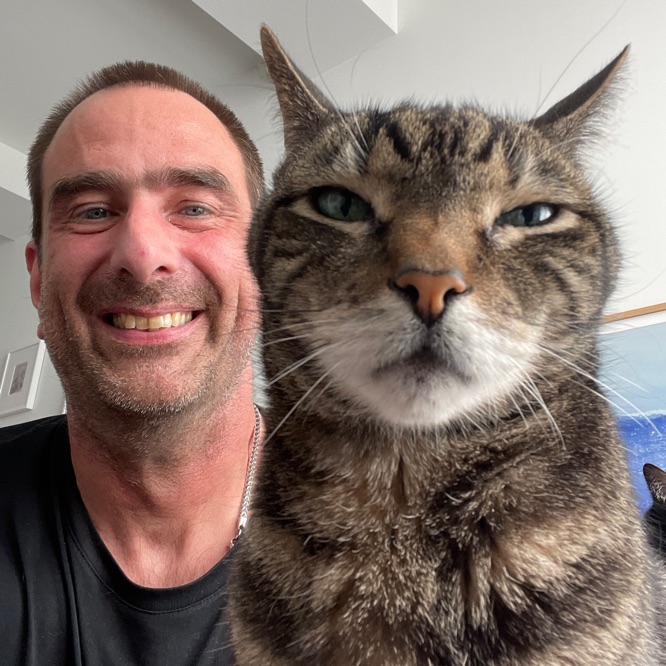
From drawers to cupboard doors, from cupboard doors to closet and room doors, and from inside doors to the apartment door, David kept on practicing for months and thereby kept on opening new levels of territorial reach. I was duly impressed. But I also wasn’t so keen on the aftermath of David’s thorough explorations. Thankfully, I can count some straight couples with children as friends. Apparently, they face similar problems with their own, human spawn. Proving that straight people can be clever too, they developed a deterrent, something called “child safety lock.” Fascinatingly, they even have stores dedicated to selling such gizmos. After a friend told me about all this, I immediately bought several of them and can attest that they have been 100% effective at keeping David out of closets and the second bedroom. Except I didn’t put locks on the coat and linen closets. David still is free to use them. Surprisingly, these child safety locks also are rather effective at keeping other gay men out of rooms.
Given his rapid progress, I should have expected that David would tackle the apartment door as well. But that door is obviously different—beyond being made from steel and hence quite a bit heavier than the others. It also marks the boundary between mine and not so much mine. King intuitively understood and respected that difference. Esteban and David not so much. If they can get there, it’s theirs. One cannot but get the impression that they have rejected individual ownership of property.
Given that this take on ownership is rather common amongst the feline set, I find it puzzling that so many Americans will cohabitate with cats. Usually, Americans of all political persuasions are prone to hysterical fits, even violent seizures, at the mere mention of “socialism.” It reliably is a spectacle. And it quickly becomes tiring. Yet when it comes to cats, those same people suddenly have no qualms covering room and board for practicing socialists. Without any histrionics. Without seizures. Having grown up in Europe, I thankfully do not suffer from this most peculiar malady. In fact, living in the United States made me realize the inherent goodness of the cause. Still, I too have to balance my revolutionary designs with good neighborly relations. Hence, just like King, I subscribe to the distinction between inside the apartment and outside the apartment—or, my apartment and the people’s hallway. Unfortunately for Esteban and David, I also impose that view onto my cat mates.
That probably explains why David waited until I was travelling in Germany in early February 2020 before staging his first apartment break. Once he realized I wasn’t coming back for the night, he probably started working the door until he worked it open. Theresa, my cat sitter, texted me in the morning about finding both cats in the hallway, with the door wide open. Despite being pretty darn certain that I pulled the door closed, I convinced myself that I must have forgotten to do just that in my rush to get to the airport. David disabused me of that notion shortly after my return when he proudly gave a paw-on demonstration of his latest skill. By now, opening the front door has become so routine, it takes him a few seconds at most.
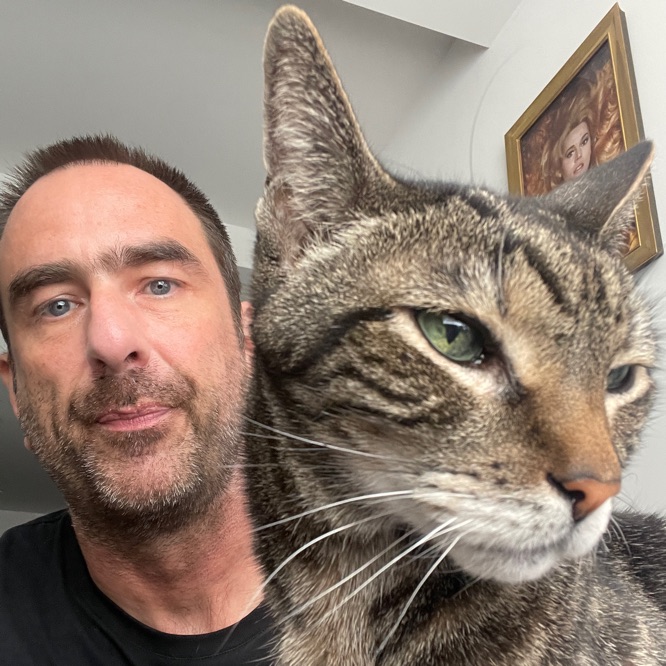
Alas, if you think about it, only a little, that’s not where the story ends. It simply can’t. And it didn’t. After all, there clearly is one more door to unlock, at least while remaining on the 15th floor: Our neighbors’ doors! Huh? One more door, singular, also is neighbors’ doors, plural? How does that work? I’d say that from a knowledge and skills perspective, there really is only one more door on the floor. The one that leads from not so much mine to definitely theirs. Amazingly, Prince David realized that transference of knowledge himself, without prompting or help from anyone including me. Unfortunately, he picked the worst possible time for his first and, so far, only attempt.
The pandemic hit New York City right after my return and it hard, devastatingly hard. For the months of March and April 2020, the city became the global epicenter for Covid. It brought the city that never sleeps to a near total standstill, with anyone who could cooped up at home and opening their door only well after the hapless delivery person had left again. I live at one of the busier intersections in Brooklyn, next to a commuter rail station, and above a subway station where ten different lines connect. There always is some noise outside. Day or night. Not so during those two months.
The city had fallen silent, completely, oppressively silent. The only noticeable sounds were the daily banging of pots and pans to honor first responders and medical personnel—and the wailing of ambulances when yet another wretched soul was rushed off to a hospital with uncertain prospects of survival. In early March, the wailing happened sporadically and mostly during daytime. By end of April, it still happened intermittently but all the time, day and night. Over those two months, Covid killed over 15,000 New Yorkers. By comparison, it would take another twenty months for Covid to kill the next 15,000 city residents. No wonder then that refrigerated trucks to hold the bodies of the recently deceased were standing outside every single healthcare facility.
I spent my days obsessing over the latest news about Covid and my nights communing with the ghosts of friends who died from AIDS some decades ago. That way, my first and second pandemic increasingly became one and the same, a continuum of deadly viral infections. I would have lost all sense of time if it wasn’t for the daily banging of pots and pans. It surprised me, even startled me more than once. Really? Is it really 24 hours later? They are banging on metal again. So, yeah, another day has passed. That way, the daily banging of pots and pans became a rather coarse time keeping device and served as helpful tether to the space time continuum. Or manifest reality as I usually call it.

To emphasize the deep disruption of those days in New York City, consider this: One late Friday in April, I decided to reconnect with the space part of the continuum and went on walk-about through Manhattan. Over three hours, I leisurely trekked from the AIDS memorial in Greenwich Village along 7th Avenue past Madison Square Garden and through Times Square, then continuing along Broadway up to 58th Street. The apocalypse had finally, actually happened and the city that never sleeps had ceased to exist. I wouldn’t have been surprised had I run into Snake Plissken. New New York felt closer to the fictional version from Escape from New York than the real deal did before the pandemic (even if the movie version actually was St Louis, Missouri). At the same time, I didn’t really need Snake. I never felt unsafe—despite encountering at most 30 humans total on the streets that night.
The funny part: I cannot stand non-pandemic Times Square, which is under permanent siege by that invasive species called tourons. It is the one area in New York City I generally try to avoid. But I really enjoyed the post-apocalyptic, pandemic Times Square so utterly devoid of people. There is something to the spectacle of all those hyper-aggressive, high-tech billboards trying so very hard to razzle-dazzle, ahem, no one. I find the contrast between intensely exuberant performance and devastating absence not only fascinating but see real beauty in this spectacular void.
The best part was that I didn’t have to battle row upon row of tourons, dressed in their outlet-mall-finest from a decade ago and marching in lockstep six or eight across. Instead I could just stroll across the square as I saw fit. I didn’t even pay heed to what, in non-pandemic times, is designated for either pedestrian or automobile use, walking in the middle of the avenue more often than not. Like people, like cars, the streets saw hardly any traffic that night. The few automobiles that were out and about were going at speeds more suitable to a suburban cul-de-sac full of children than Manhattan, which left plenty of time to step out of the way.
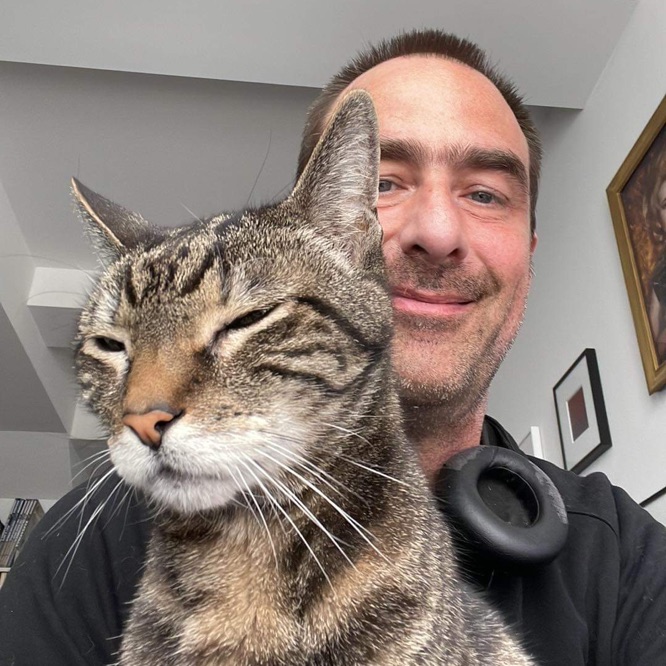
Around the same time of night a couple days before or after my walk-about—remember that time was elastic during those months—I was sitting on the floor outside my apartment, face mask on, reading and listening to music on my headphones. The cats were roaming about in the hallway and, last time I checked, had made it to the far end, just before the turn to the elevators. When I noticed some unusual movement to my far left and turned my head, I saw Prince David performing pull-ups on 15H’s door handle—which is just what he does when opening a door. At 2am in the morning. During a deadly pandemic. When NYC was its global epicenter.
My heart skipped a beat. In my mind, I was already picturing my arrest a little while later, with the officers openly ridiculing me for maintaining that, no, I didn’t do it, it was my cat. At the same time, I was running down the hallway faster than I thought possible. When I got to the door, phew!, I was mightily relieved to find it still closed. Esteban really picked the perfect nickname when he started calling Prince David “the royal maniac.”
I feel compelled to add a disclaimer here: Yes, the pandemic was deeply traumatic for me. That has a lot to do with the fact that I was dealing with two simultaneous pandemics instead of one. That’s a bit much. At the same time, I am very clearly one of the privileged. While I was jobless at the time, I had a nice, large apartment at my disposal and sufficient funds to pay for food, clothing, and so on. Because I could isolate from others and consistently wore face masks, I didn’t get Covid until 2.5 years into the pandemic and didn’t require mechanized help to keep breathing. I wasn’t homeless, roughing it on streets that were quite a bit more frightening because generally deserted. I didn’t have to queue at food pantries or otherwise go starving. My basic needs were covered. For far too many, they were not. That this happened in one of the richest countries on Earth just shows how deeply rotten this country really is.
Likewise, I feel compelled to express my frustration here: The disregard so many people showed for other people’s health was simply infuriating. Between the devastating possible outcomes, not “only” death but also Long Covid, and some of us being immunocompromised, the pandemic was hell enough. But instead of supporting each other, many chose to make the pandemic an even worse hell. The bottom line is that consistently wearing a face mask is no great imposition. Insisting on the freedom not to wear one is an astounding display of egotism. After all, that also is the freedom to infect others with a deadly virus.
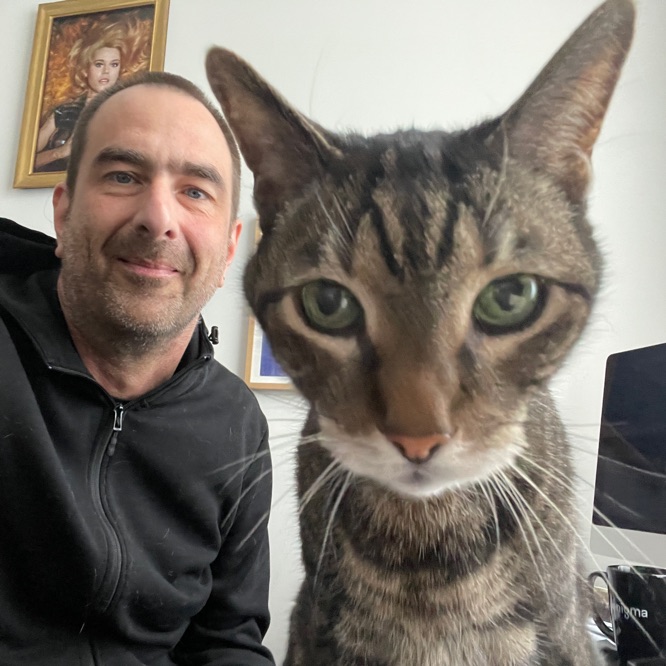
I got so frustrated I publicly shamed a neighbor from another floor on Twitter. Of course, he wasn’t happy when he discovered his mug with my choice caption. So I endured his tirade when he found me outside smoking without much push back. But when he retaliated with homophobic and transphobic comments every time he saw me, he only confirmed that he deserved to be called out.
A friend observed that if we gays had taken to safer sex during the dark days of AIDS like straight people took to face masks during Covid, we’d all have been rounded up in concentration camps. I used to concur but the on-going open season against drag queens and trans folk in states such as Florida shows that it doesn’t even require widespread violation of public health guidance during a plague. Apparently, our very existence is so threatening it justifies the withholding of health care. That approach has the additional benefit of avoiding the bad press associated with camps while also making the resulting deaths much less conspicuous.
It was a grave mistake to allow marriage equality to lull us into complacency and assimilation. It also was a grave mistake to hitch our political interests on a single political party, which just takes our support for granted. Case in point is the Biden administration’s slow and bumbling response when we gays were facing pandemic #3, mpox, during the spring and summer of 2022. Since the same vaccine covers smallpox and mpox, the United States has been sitting on many millions of doses of an effective and safe vaccine in its strategic reserve.
But those doses hadn’t been filled into vials and packaged for distribution. Instead they were sitting in large batches in the manufacturer’s freezers in Denmark. The responsible agency, the Federal Drug Administration, ignored mpox for several months, then insisted on an unnecessary inspection but also did nothing towards that inspection for several more months. Further compounding the crisis was that the trickle of vaccine that made it to the US wasn’t distributed according to need, making a bad situation in the most severely impacted city, New York, even worse.
Against that background, it is not surprising that I couldn’t get a vaccine appointment despite trying hard for over a month. One week, I was lucky enough to get a slot but then lost it again when the system errored out during the confirmation process. So frustrating! I had started looking into getting vaccinated in Germany when a tranche became available while I was on Twitter and I saw the tweet right after it was posted. Alas, the supply issues got only worse over the summer. As a result, I got my second shot four instead of three months after the first and only as a significantly smaller dose. Meanwhile a friend who hadn’t been as lucky in lining up appointments got infected. He was utterly miserable for two weeks, though did not have any lasting complications. Thankfully! My one consolation in all this is, should Russia or Iran or North Korea or Da’esh attack the country with smallpox, we gays will shrug our shoulders and keep on partying.
Back to Basics
As Esteban got older, the tireless kitten gave way to an incredibly social cat, who eventually gave way to an aging supermodel who needed his beauty sleep, lots of beauty sleep. For the most part, that is just the normal cycle of seasons in mammal life. At the same time, the pandemic certainly didn’t help and probably only heightened this turning back to the basics. Still, basics isn’t exactly a precise term and Esteban’s basics might just as well count as eccentricities for most house cats.
Let’s start with food stuffs, particularly plants. A few days after Esteban’s passing, my neighbors in 15G made the sweetest gesture by leaving a bouquet of flowers outside my door. It still is one of only a handful of times that I smiled with genuine mirth. Since I discovered the flowers when heading out to meet a friend, I left the flowers right there outside my door. See, if Esteban had still been alive, the vase would be close to empty upon my return and the flowers would be half eaten and half spread around kitchen and living room. When he still was a kitten, I thought I could prevent him from getting to potted plants and built elaborate mesh wire contraptions to protect them. But Esteban reliably eventually went for the kill, even for spiky cacti.
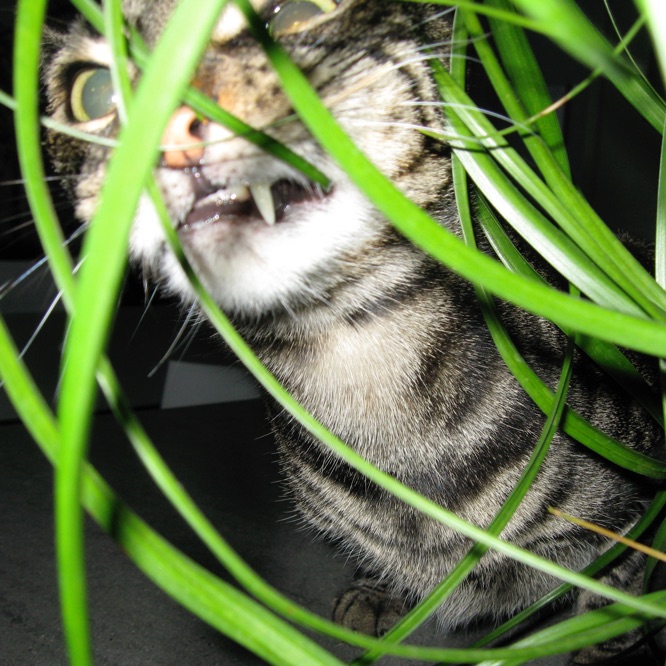
Or for ficus trees: Over several years, I had nursed a rather forlorn looking ficus shrub into a beautiful tree larger than even me. I’m not sure why, but the tree was positively thriving under my laissez-faire approach to plant care. Esteban sampled maybe a leaf once in a while, but largely left it alone. It probably helped that ficuses are indigestible for cats and that he reliably threw up those samples again. But then one day Esteban apparently went “what the heck!” and started eating—and throwing up—from the tree every single day. After noticing that Esteban was somewhat dehydrated, the vet recommended getting rid of the tree. So I did. My apartment has been barren ever since—except for the occasional catnip. But that was a knowing sacrifice to the great destroyer of plants.
After I got home again, I brought the flowers in with me, set them up on the kitchen counter, and waited a while. But unlike Esteban, David didn’t come running to go postal on those flowers and, besides pulling out one or two small ones, left them alone over the following days as well. So they brightened up my kitchen and life for well over a week. Thank you, Jan and Richard!
Esteban himself reminded me of another, stranger taste preference during the last week of his life. Karin had come one morning to say her goodbyes and all three of us had sat down on the floor in the kitchen area. Over the course of the conversation, our attention shifted away from him and he left us to it. When I noticed him coming back and grooming his face, I was puzzled. I had fed him fairly recently and he had eaten all of his special cat treats, which were the only food he’d still eat. Then I remembered: I was in the middle of breakfast when Karin arrived and had just prepared a slice of bread with a generous spread of butter and lots of honey. Alas, the butter and honey were no more. Esteban had licked the bread clean!
I had known that Esteban had a pronounced sweet tooth ever since I caught him licking granulated sugar straight out of the sugar bowl. But I haven’t enabled it since noticing. Or that’s what I thought when I first started drafting this section. Then it dawned on me that the one food ritual the two of us shared also indulged his sweet tooth, even if it was only a little. There is only one of those rituals because, out of principle, I don’t share human food with cats. As it turns out, laziness sufficed for starting this one.
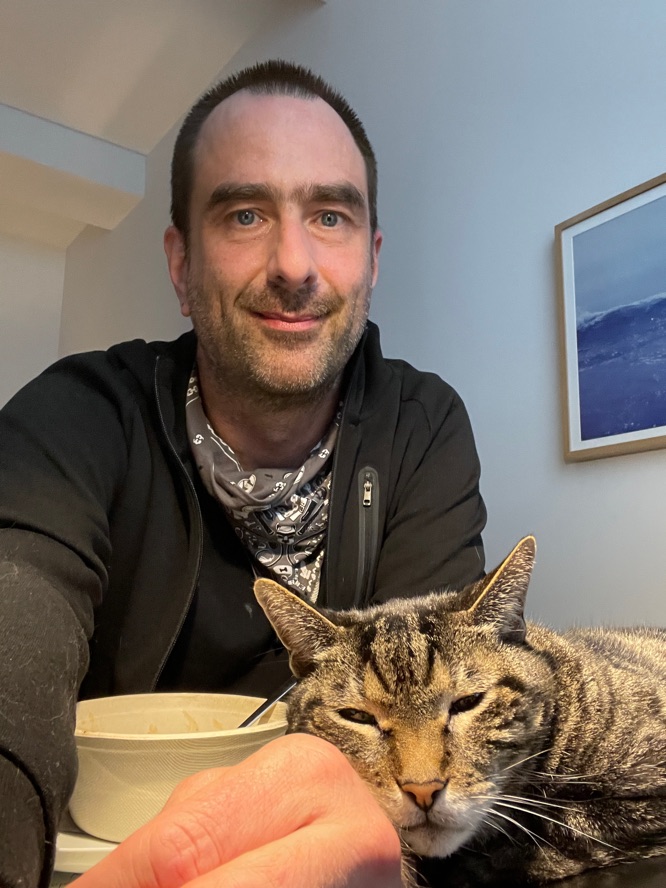
I have the occasional bowl of cereal while busy working and tend to let the emptied bowl sit on my desk before bringing it back to the kitchen. Since Esteban spent significant time right next to me on the desk, he soon discovered that what I call an empty bowl contains enough milk sweetened by cereal to make it worth his licks. He loved it. In fact, he loved it so much that when he’d hear me pour cereal in the kitchen, he came running so that he could follow me where ever I’d sit down. He then positioned himself right next to me and impatiently waited for his turn. When I was getting close to the bottom—or was taking too long—he’d start pawing for the bowl. And when it finally became his turn, he’d greedily lap up whatever remained.
Whereas Esteban’s eating habits reflected a genuine love of food, Esteban’s puking habits were altogether different. First, several seconds before he’d barf, Esteban would loudly announce that he was about to retch. He even had a dedicated and attention-grabbing sound for the occasion, somewhere between a foghorn and Cher intoning “be-lie-ie-ie-ve” in her eponymous song. After thusly sounding the alarm, he’d try to make it to the runner in the entrance area. Finally, he’d throw up onto that runner. Amazingly, he managed to further dial up the bizarre over the last few months of his life. The first time he did so, I had heard his clarion call from the kitchen, but was stuck at my desk in a video conference. When I finally could go looking, I couldn’t find what he had brought up. Great, I don’t have to wipe his half-digested food from the kitchen counter. But where did he…? That’s when I noticed that one of the food bowls was full again without my doing….
When I started thinking about this section, I wasn’t sure whether the above was simply too much information, or at least too mundane or trivial to really be of interest. My grief overrode those doubts: With my memories of Esteban all that I have left, even his daily habits and ticks have taken on outsized meaning. Not including them here felt like a betrayal.
Now that I have written the section, I am glad I pressed on because it helped me make two loosely related realizations. The first is that the impact of the pandemic very much lingers, with my life still focused inwards and domesticity still playing a far larger role than it used to be. I suspect I am not the only one to have retreated like that from the world at large. That is not to say that I am not paying attention to what’s going on outside. I do.
But I do experience the outside world as far more alien and alienating than ever before. I am also not sure whether I am ready to change any of that. Between mpox and a friend just having been hospitalized with Covid, it hardly seems safe out there. If I also look at larger societal trends and notice the rise of nationalism and fascism across the West—even though they already caused two world wars—as well as our collective inaction in light of the existential threat of climate change, the confines of my home certainly seem safer and altogether more appealing.
The second realization is that many of my own mundane habits and household rules are a response to the cats, particularly Esteban. The most important ones include:
- Don’t leave a glass with water or cocktail unattended.
- Don’t leave anything edible unattended.
- Rinse food remains off dishes right away.
- Always close the lid after using the toilet.
- Check toilet after guests used it.
- Never open windows more than a small crack.
- Immediately throw away rubber bands.
- Immediately throw away ribbons from gifts
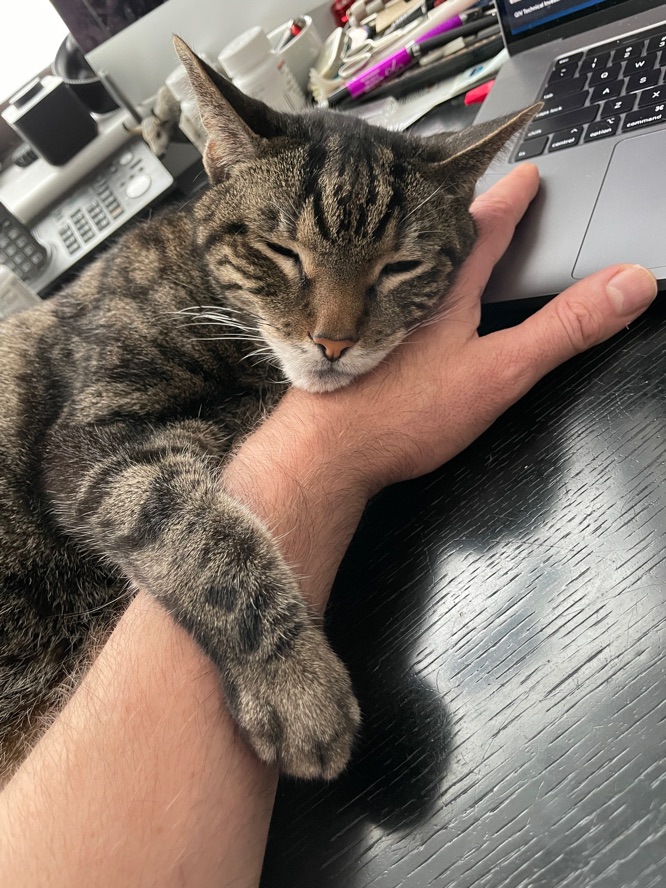
The one time I was a bit slow to throw away a ribbon, Esteban had already ingested some of it. Pulling that out of his mouth again was not something either of us enjoyed. But that wasn’t the end of it. Ribbons can be deadly to cats because they often cause stomach obstructions. Hence I had to closely monitor Esteban and his poop. Two days later, my vigilance was rewarded with a poop pellet that—thanks to the ribbon sneaking out at one end—would have made the perfect Christmas tree ornament. Alas, that would have been a clear violation of the next two rules:
- No Christmas tree ornaments: They will just be thrown around.
- No Christmas tree: It will just be thrown around.
- Re-engage child safety lock after opening the closet.
- Keep the front door double-bolted.
- Make sure the mattress is always covered by a spill cover.
- Always lock keyboard and comforter into closet before trips.
Admittedly, I have gotten less stringent about the latter two since King’s passing. He simply couldn’t approve of me travelling. It went against everything he believed in. So when I did travel nonetheless, he had to make himself heard. At first, he tried puking all over my rather expensive ergonomic keyboard. Then he decided that being pissed meant pissing, typically on our bed. As far as retributive acts are concerned, they were a mixed affair. Some of it was surprisingly effective at getting back at me, largely due to the replacement costs for keyboard and mattress. At the same time, it was all too obvious and crude—and hence not up to King’s usual, rarefied standards.
King did eventually develop a way of expressing himself that reflected real artistry. Unfortunately he did so only a couple of months before his death and so one single performance remains King’s only contribution to contemporary art. I had been on a 24 hour sojourn to the Jersey shore, keeping my trip short out of concern for an ailing King. When I arrived back home, everything was fine. I said hello to the cats, dropped my duffel bag in the bedroom, and headed out again to buy cat food.
Upon my return, I found the duffel bag, still zipped closed where I left it with a puddle of cat piss on top. Yet there was not a single drop of spillage on the floor. It was an astounding achievement, referencing Marina Abramović’s brand of intensely personal performance art as well as Andres Serrano’s Piss Christ. It also was the far stronger work, an intensely personal piece that was utterly fascinating yet also deeply revolting, and ultimately absolutely baffling. Simply wow!
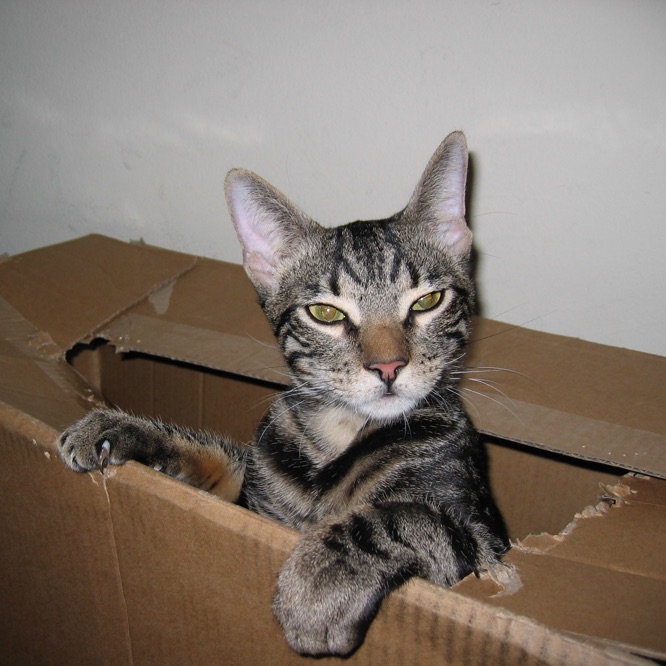
Back to above list of does and don’ts. They mostly cover the basics. Only the last rule hints at the fact that travelling isn’t easy. There are no spontaneous weekends out of town because I have to organize a cat sitter first. My friend Karin kindly served as such several times, even sleeping at my place. But when Esteban rewarded her generosity by head-butting her at 3am, come play, she understandably called it quits. Friends of friends, kids of friends, the staff at my vet formed the cat sitter recruitment pool over time. For the last several years, Theresa served as tender loving stand-in during my travels. I’m so thankful for her care!
Alas, looking at this list, I can’t help but feel a bit like I’m under siege in my own home. Cats seem to be rather terrible judges of what’s good for them and what isn’t. An additional challenge with younger cats is that they are bound to leave a trail of destruction. I believe I have successfully convinced David to stay off the large-format painting by Peter Tomschiczek in the living room, even though the painting incorporates bird feathers and bones. But evidently I didn’t achieve the same for the red sofa below, which now sports a large tear with the stuffing poking out. I admit to having watched a lot of kitten videos over the last two months. I also admit that I’m exceedingly wary of bringing another cat into my life.
Friend, Compañero
It all started 19 years ago when, prodded by my then partner, I made a leap of faith, picked Esteban, and gave him the time and space to pick me too. I started this remembrance by claiming that, from his perspective, I became his bitch on that first day. That word seemed safest without unduly anthropomorphizing the cat. Alas, in addition to being suffocatingly heteronormative, it too is way off because—ignoring that one, short time he licked my right nipple while my then partner licked my left nipple—our relationship never was sexual.
The often made claim that we humans only are servants to our cats doesn’t help much either. In fact, it is the worst kind of observation, one that purports to be clever when in manifest reality it is pure misdirection: What opportunities for self-sufficient life present themselves to an indoor cat living on the, say, 27th or 15th floor of a NYC apartment building? We take care of our pets because we put them in an environment where they are entirely dependent on us. In fact, the same argument can be made about toddlers, but we don’t usually accuse them of abusing us as indentured servants. Maybe that’s because the vast majority of toddlers grow beyond the cognitive acumen of a three-year-old and have opposable thumbs all along. Be that as may, cats most definitely do not.
The point: Even under analytical scrutiny, despite all the obvious differences and inequalities, I cannot but see something mutual that allowed both me and Esteban to experience sincere companionship. It may have lacked the intellectual or carnal pleasures always present as a potential between humans. But likewise, it also came without all the added complications of most human relationships. That’s precious as far as companionship goes and even amongst humans limited to a very few, very close friends.
The differences and inequalities turn the companionship into a heavy burden when Esteban gets sick. How to do right by him when he won’t talk, when there is no consent, informed or otherwise, when watching him for clues is akin to reading tea leaves because there is so little difference between “it’s bad but I can manage” and “I just can’t go on anymore.” Worse, negotiating all that doesn’t get any easier with repetition. On the contrary, it only gets worse. And I had been through all this with King already.
I got my first taste of what was to come about two years ago. Esteban had been diagnosed with early kidney disease some months before. That would have been manageable if he would eat the special renal diet. But he never warmed up to it. I tried every single flavor of every single brand I could get my hands on. He maybe picked at it. But he never ate it all, preferring to go hungry instead. Not surprisingly, he was losing weight and he did so at borderline dangerous rate. After yet another vet visit charting that precipitous decline, I gave up on trying to manage his kidney disease and accepted that he found the renal diet inedible. If that’s what will kill him, I’d rather have him enjoy his final year—because if that decline had continued, he wouldn’t have made it through the year.
He did make it. And he did enjoy the year. When I announced to the vet a year later that we simply did the opposite of what they had recommended, she was taken aback at first. But after checking him out, she also agreed that he had stabilized. The blood work confirmed that his kidney disease hadn’t progressed much either. Unfortunately, it also added another diagnosis to worry about: Hyperthyrodism. Properly medicated, that disease too is manageable. But again, manageability was hard to come by. The pills made Esteban throw up every few days, which isn’t particularly helpful for a cat who is already too thin. So we switched to a creme to be rubbed into his ears. Now the vet’s unrealistic instructions interfered with my unsteady sleeping schedule and we took a while to find rhythm that worked for me and him.
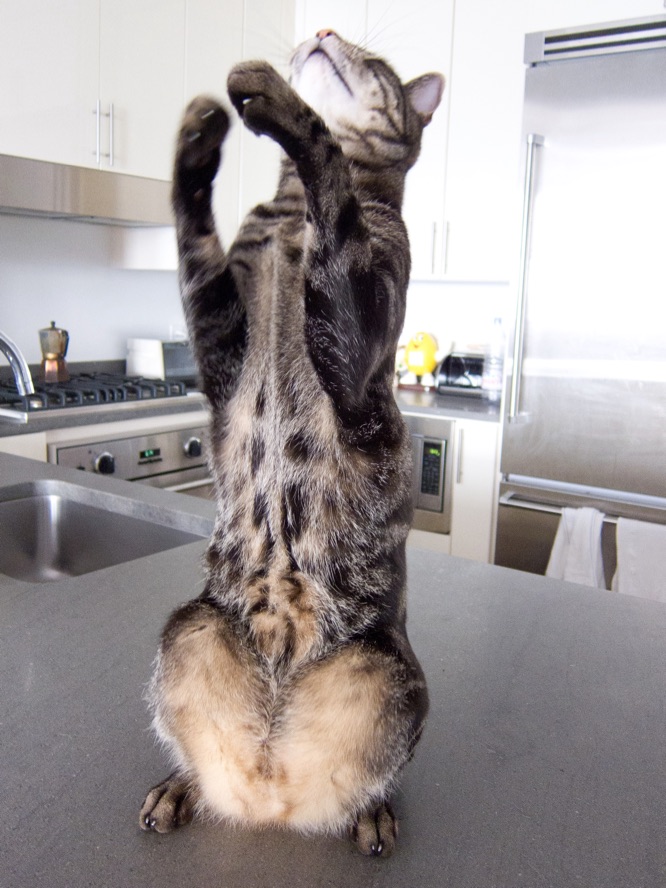
We had just gotten the hang of it, when during his last vet visit in May, she noticed a lump in his cheek. I didn’t have to wait for the vet’s explanation. I immediately knew what that implied. Indeed, her explanation wasn’t encouraging and included words to the effect of “things happening fast.” On the off-chance that this might be an infection only, she also prescribed an antibiotic. It didn’t help prolong Esteban’s life, but it did regulate his breath, which made cuddling more pleasant again.
Things did happen fast, indeed. I checked. Esteban lasted only six more weeks after that final vet visit. No wonder that it felt like it was over far too quickly, with the weeks in between nothing but a blur. There are things in life that don’t get easier with repetition. On the contrary, they get only harder. Caring for a loved one until their end must be the worst. At least, it has been for me. The foresight of what was yet to come was an additional burden and caused me to grieve already while Esteban was still alive. At times, I had to hide in the second bedroom, writing code, the one sure way I know to cope with almost anything. I felt guilty for not being out there with him at all times, but I also needed that space, physically and metaphysically, for myself.
When cats approach the end, their routines fall apart and they increasingly withdraw. The signs can be rather subtle at first, but towards the end they tend to become loud and clear. All the vets I ever interacted with seem to agree that easing the passing to the Great Catnip Fields with euthanasia saves cats from needless suffering. Knowing King’s and Esteban’s suffering at the end, I tend to agree. But when shelters kill perfectly healthy cats due to overcrowding, we are on a very slippery slope towards murderous abuse. In other words, euthanasia may be a blessing but it also is incredibly difficult to wield responsibly. I am so very thankful to my friend Stephanie, who just might qualify as a crazy cat lady. That made her counsel over those weeks invaluable, if only to save me from endlessly second-guessing myself. Thank you!
Amid the falling apart and withdrawing over those weeks, the striking part was the urgency and intensity Esteban put into the few things he still had strength enough to care about. Consider drinking water. Shortly after diagnosis of his kidney disease, I purchased a water fountain with built-in filter, so that he would always have fresh water available. Esteban loved it. But then David moved in and reliably went wild splashing around in the water, which somehow always ended with him knocking over the fountain. Mind you, by then I had lived with cats long enough to put the fountain into the guest bathroom’s tub. So David’s antics didn’t cause any flooding but they also made the fountain pointless.
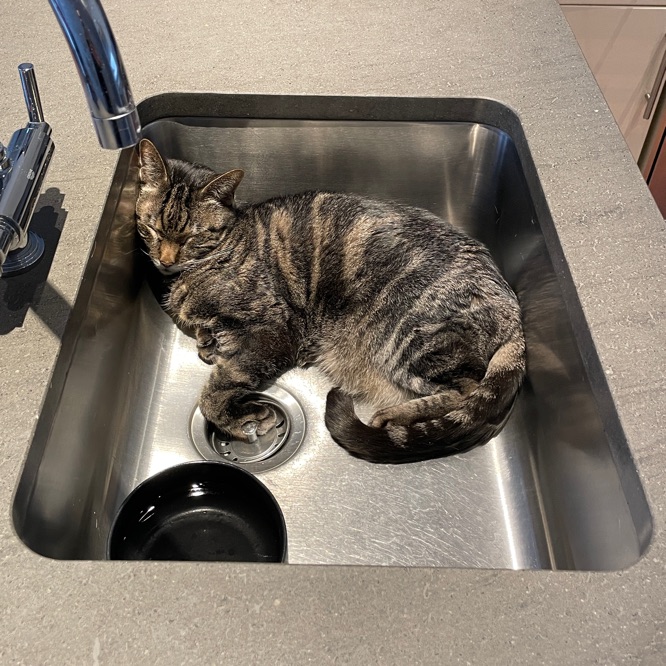
Esteban refused to go back to drinking water from a bowl. At first, whenever he was thirsty, he’d position himself next to the kitchen sink, waiting for me to open the faucet for him. Or, if he heard me cleaning dishes, he’d come up and try to drink some water. Except on those occasions, the water was on hot. So I had to fend him off until the dishes were done and the water had returned to being nice and cool—and safe for him to drink. Since I wasn’t always around, Esteban took to napping right there in the sink. And since dishes often got in the way of that, he shifted his allegiance to the guest bathroom sink.
Once the water was flowing, Esteban might take his time drinking. So I often walked away again and closed the faucet at the next opportunity. I got so used to some faucet running somewhere in the apartment that one day earlier this year I forgot that I had also closed the sink to soak some dishes and went off to take care of something else. By the time I remembered the sink, my kitchen and dining area had turned into a lake and the apartment below mine had gained a water feature from ceiling into their sink. Thankfully, my sink hadn’t been overflowing for too long. So mopping up the lake and using a floor blower for several days were enough to restore my apartment. Alas, the unit below needed parts of the ceiling replaced. I was apprehensive about dealing with insurance at first, but they processed the claim expediently and fully covered the damage.
As you can see, just making sure Esteban had fresh water to drink had become a complex dance of competing interests for all three parties in the household. During his final weeks, Esteban dispensed with the niceties and made sure that his interests came first. He loudly called for my attention when he felt the need for food or drink. Clearly, him wasting away added urgency to both. More than that, I suspect that his hearing was impaired as well. That wouldn’t be surprising given the tumor in his cheek and explains him meowing quite a bit louder than before. It also meant that once he slept, he was noticeably harder to wake again. That freaked me out at least one morning when I had woken in an otherwise empty bed, went looking for him, all tense and worried, found him on the sofa in the living room, but he wouldn’t respond at first to me calling his name.
To make his last weeks as pleasant as possible, I headed to the very fancy flagship store of a big box chain in Union Square and raided their cat treat section. Esteban was all in favor of the treats, especially the puree in a stick kind, but he was happiest with nice and juicy chicken, salmon, and tuna filets. In fact, he liked them so much, he refused to touch his regular food thereafter. I managed to appease him somewhat by covering regular food with puree. But the only real option was to head back to the fancy flagship store and stock up. When they had far too few filet treats left, I ruthlessly played the dying cat card with employees. Their reaction was really sweet. More importantly, after checking the computer for other locations’ inventory, they remembered the stash downstairs, next to the cash registers. Relieved that I didn’t have to travel midtown or worse, I bought most of them, figuring that that should be plenty. There was just one filet left after Esteban’s death. The royal maniac happily ate it as well.
The tumor had one other immediate consequence: It was pressing on Esteban’s jaw. As a result, he couldn’t quite close his mouth anymore and drooled all the time, often dragging a long thread of spit around with him. After his death, the sheep rug he had been sleeping on next to our bed was so drenched, I had to throw it away. This would have grossed me out in any other cat—or human. But with Esteban, it simply warranted a pragmatically nonchalant wiping of his mouth every once and a while. Admittedly, I did so more aggressively when I was about to eat, lest he slobber all over my food as well.
Besides that, I was surprisingly busy over those weeks trying to make workable arrangements for the inevitable end. As for King, I wanted to spare Esteban the stress of a trip to the vet just before death and instead tried to arrange a far more dignified passing at home. But my own vet started imploding just at that time. (Gee, I wonder if selling out to an investment fond has anything to do with it.) The two vets that came recommended for at home euthanasia struck me as expensive, around $900, and their phone manner, all professional niceness and efficiency, was not what I was looking for. Nonetheless, due to a lack of other options, in early June I made an appointment for the following Monday. But then, Esteban rallied over the weekend and I cancelled again. Truth is, I wasn’t ready and wanted more time with him. It didn’t help that that day was my sister’s birthday.
As it turns out, the cancellation bought us one more week until the following Monday, my own birthday. Over that week, Esteban spent only one night in bed with me. Instead, he withdrew more and more, spending serious time hidden underneath the bed. At times, when I walked by, he’d emerge loudly meowing and guide me to the kitchen. It obviously was time for more treats. It also was time for a plan other than winging it. Esteban’s regular vet offered euthanasia at the office, but couldn’t do it any earlier than a week and a half later. Then Theresa, his sitter for the last several years, gave me the name of another vet who does house visits. When I called, Dr Fragola’s assistant was warm and gentle. That made all the difference for me and I took the first available appointment, on my birthday at 2pm.
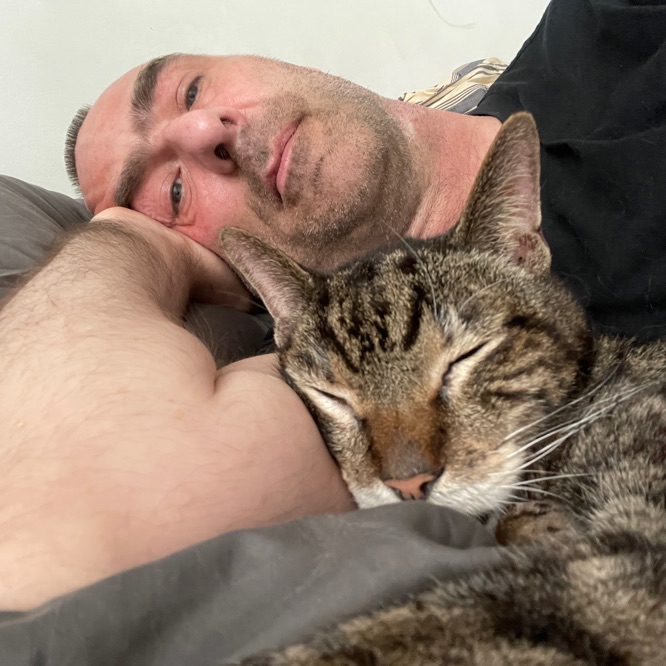
On the day of, there wasn’t nearly enough time. Still, we got to snuggle one last time while listening to Benjamin Britten’s War Requiem. Esteban at first didn’t want to come up on bed, despite my repeated calls. However, after I grabbed him, he immediately curled into my arm and stayed there for the duration of my favorite Requiem. Alas, the desperate pleading of the Libera me cut far too close for comfort and he got up, helping himself to a fortifying snack in the kitchen.
Shortly thereafter, my friends Cordula and Ako as well as Dr Fragola arrived. Dr Fragola took her time explaining the procedure to us and then set up in the bedroom, where Esteban was hiding under the bed again. While I was feeding him some last bits of puree from a stick, she injected him with the sedative. He slowed down eating for a moment and then collapsed on himself right there on the floor. After making sure that he was deep asleep, Dr Fragola followed with injection of the anesthetic and minutes later Esteban was dead.
It helped to have friends there. Thank you, Ako and Cordula. Yet despite knowing what to expect, watching Esteban die shook me to my core. All it took was injection of two small syringes and his life was gone, no more. That’s frighteningly little to snuff out a life. We may not routinely perform euthanasia on humans, but my understanding is that it doesn’t take much more to end a human life as well. Meanwhile, the already devastating impact from climate change serves as warning writ large that it doesn’t take much to exterminate almost all life on planetary scale.
Yet we go on with our merry destruction, extinguishing all hope for life of future generations. As if that wasn’t terrible enough, we go out of our way to make others miserable and snuff out their lives because they have the wrong nationality, skin color, gender, gender expression, sexual orientation, and so on. The ostensibly pious are the worst. The heretics, blasphemers, and idolators calling themselves “Christian” in this country should pray that יהוה doesn’t resume Their micro-managing ways because, if They did, this country would be littered with salt pillars.
Living in this country for decades has taught me that capitalism à l'américaine is a vicious, malignant disease that only thrives on exploitation and destruction. Working for Facebook has taught me that running a fundamentally criminal enterprise and helping to bring about a genocide here or there is perfectly acceptable, as long as the people profiting are the right ones and the people dying are the wrong ones. Climate change has taught me that European superiority when it comes to human rights is only skin deep, to be drowned in the Mediterranean when given the first opportunity.
And now Esteban is dead, too!
“My Titanic Tears”
One thing that did get easier the second time around was purchasing a suitable urn for Esteban’s earthly remains. When faced with the same task after King’s death, I discovered, much to my dismay, that the people who sell urns for cats not only hate cats and the people who cohabitate with them, but hate them so intensely they feel compelled to inflict horrible suffering on people like me just when we are at our most vulnerable, after a beloved cat’s death. There simply is no other even remotely plausible explanation for the utterly devastating ugliness of their wares. In fact, they are so horribly heinous, prolonged exposure is bound to result in eye cancer. When browsing for cat urns online, I immediately recognized the threat and kept my exploration to a short minimum. Still, I suffered from blurry and flickering vision for days afterwards.
Once my vision was restored again, I headed to physical stores selling household wares. I avoided high-end design stores and low-end discounters alike and instead focused on the mid-tier, stores that offer quality and clean design. That strategy worked like a charm. The first store I stepped into was running a sale for French cocktail shakers. I didn’t look further. French cocktail shakers are ideal as urns because they comprise only two parts, similar to Boston shakers, but those two parts fit seamlessly together, unlike Boston shakers but similar to three-part Cobbler shakers. As a result, French shakers come fairly close to Ancient Egyptian designs, which to this day continue to set the benchmark for cat urns. This time around, I couldn’t find any French shakers, on sale or otherwise. So I settled on a simple earthen jar. It was on sale, too. Sold!
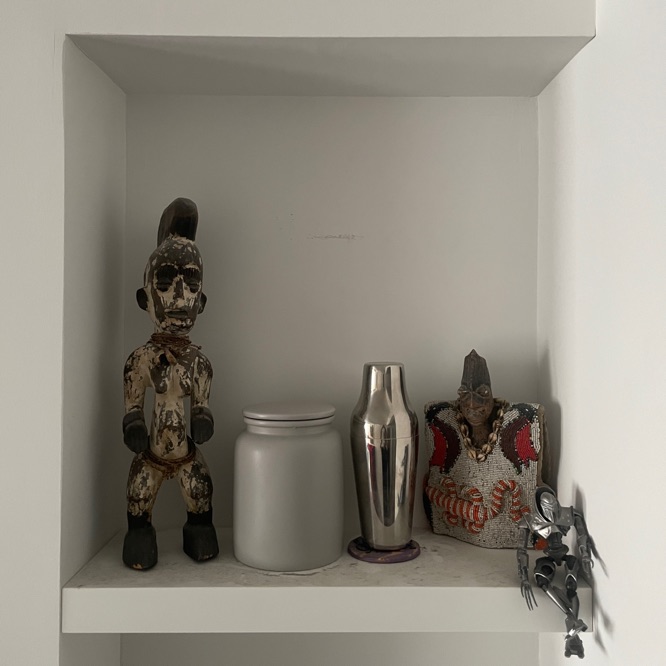
In death, King and Esteban rest on the top shelf of the nook dedicated to my ancestral spirits from West Africa, including the Ewe in today’s Ghana. Years ago, they welcomed King in their midst and, a few weeks ago, they extended the same welcoming generosity towards Esteban. During his lifetime, King always was unabashedly big boned. In contrast, Esteban was a svelte feline supermodel. He did grow a little pouch later in life, but by then he had most certainly earned it. That makes it rather ironic that King’s earthly remains occupy the lean form of the urne égyptienne whereas Esteban’s remains are in the far more robust jarre de chat.
Meanwhile, David isn’t one to be left out and, well over a year ago, struck up a friendship with one of the ancestral spirits. That may sound a bit strange, but when you consider that Nkondi are aggressive spirits that can leave their wooden body and pursue their enemies, it makes perfect sense that the royal maniac would seek out the Nkondi. I’m glad that he found a friend, especially now that he is the only feline in the house.
None of that, however, helps alleviate my grief, which exactly two months after Esteban’s passing, hasn’t lost any of its edge and leaves me feeling lost, depressed, and at the edge of despair. But I’d lie if I claimed that I am only grieving about Esteban. I am also grieving about the end of human civilization. At our rate of inaction, we won’t make the next century. It’s a bit uncanny how Esteban’s life and life at planetary scale resemble each other: They are incredibly precious and so easily lost. Two injections, two degrees. Both are lethal.
There is, however, one significant difference. Esteban’s death was painless. He passed out while enjoying his second-favorite treat and never woke up again. In contrast, our deaths from climate change will be exceedingly gruesome indeed. On offer are slow and agonizing deaths from heat and hunger as well as fast and terrifying deaths from flood and fire. We won’t have much control over which way we’ll go and, in any case, they both are exceedingly violent, without dignity or peace.
Meanwhile, Earth’s transformation into Hell is progressing at a frightening clip. Devastation from flood and fire is spreading and threatening ever more of us. Two years ago, the waters of the Ahr in Germany rose from less than one meter depth to almost 10m in just a couple of hours and drowned 134 people. One year ago, a third of Pakistan was flooded. Just a few weeks ago, two thirds of Slovenia were impacted by floods. Two thirds of a country. Two thirds!
Five years ago, wildfires erased Mati, a suburb of Athens, Greece, and 104 people perished. A week after wildfires erased Lahaina, Hawaii’s former capital, the death toll stands slightly higher at 111. But with over 1,000 people still missing, it is bound to grow to many times the current, already record-setting count. Yet we still deny the undeniable and pretend that we have time, that this isn’t an existential threat to all of humankind. However, when it comes to causing climate change, the responsible parties are far fewer than all of wo·mankind and the main culprits are clearly us, the people of North America and Europe. Almost all the carbon in the atmosphere that’s turning Earth into living Hell is ours. We are the monsters every horror movie warns about.
And it’s not just our natural environment that’s getting awfully close to irreversible collapse. It’s our cherished democracies, too. Unhinged nationalists and fascists now rule Hungary, Poland, Israel, and Italy. They are gaining in the US, Germany, and France. The UK falls somewhere in between. It is terrifying to watch them agitate against LGBT folk, to watch them deny climate change, as Republicans in the US and AfD in Germany do as a matter of policy. It is mind-boggling that Israel, the country founded by survivors of the Shoah, figures on this list. But then again, it is mind-boggling that anyone would fall for this shit, when we know full well that nationalism and fascism are the root causes of two world wars. It won’t work out any better this time around. That much is certain.
In my grief, I am liable to break down sobbing at the slightest trigger, no matter where I am. Doing so on the street or on the subway certainly is awkward. But I can’t help it. With the private and public so bleakly and hopelessly aligned, tears are just about the only thing I have left. It’s funny how New Yorkers aren’t bothered by a grown man sobbing on the subway. But it’s also sad that no one ever says “I’m sorry it’s this bad. Can I help?” They aren’t ready—yet. And so I continue with my public displays of despair on my own and by myself.
This alignment of the private and the public makes me seriously wonder whether the apocalypse is already well under way. Alas, our most authoritative source on the apocalypse, John of Patmos’ Book of Revelation or ἀποκάλυψις ( “apokalypsis” ) in the original Greek, is a hot mess and therefore next to useless. In a way, that is to be expected when יהוה grants visions of the future. The after-vision headaches alone can easily drive a perfectly sane person with a great support network into madness. But when John stepped off the last ferry to Patmos one night in 80 AD, freshly exiled to the island, and the local yokels had nothing better to do than exile him again, up the mountain into a cave, he was close to snapping. And shortly thereafter יהוה picks him of all people as Their messenger….
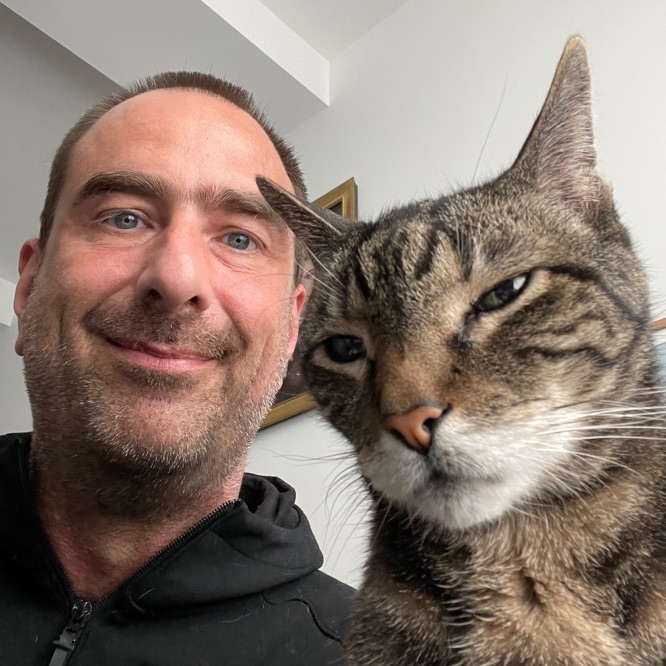
I can’t claim divine intervention or revelation. Since יהוה long ago stopped Their micro-managing meddling in human affairs, any such claims should be met with the utmost suspicion anyways. They reliably are nothing but particularly foul forms of hubris and heresy. My insight is distinctly human, the result of having a bit more time than most and a tendency to look where most others prefer that we don’t look. That tendency goes back to my teenage years when I tried to wrap my head around the unthinkable, the industrialized annihilation of a people by us Germans. Listening to survivors of the Shoah, what came up over and over again, what compelled them to survive was a desire to bear witness, to tell their story to the world.
I was deeply impressed and internalized the lesson. It ended up saving my life during pandemic #1. Still, that pandemic killed far too many of my friends. Then pandemic #2 and pandemic #3 made ample clear that nobody really cared to listen to us anyways. Whether we knew a thing or two about surviving a plague didn’t really matter. So who do we bear witness to when human civilization is breaking down? When climate change threatens all life. When more and more people push north to survive and us North-Americans and Europeans slaughter them at our borders?
You think that’s hyperbole? Think again: The Greek coast guard already routinely kills migrants with silent approval by the EU. The recent drowning of 750 people with just one boat will probably remain an exception because it was far too conspicuous and the coast guard’s lies too obvious. Usually, they murder migrants in smaller groups of around a dozen. Take them out to sea and abandon them on a rubber dinghy. That’s premeditated murder, even if they let the Mediterranean do their dirty work. So who will listen in the future when even today people stopped listening and instead turn to climate change denying fascists? Who?
And if there’s no one left to listen, why go on?
People in the know claim that cats require structure and routine. That may very well be true in general, but that’s not how the relationship between me and Esteban worked during the last few years. It was him who provided structure and routine for me. It was him who gave me the illusion of almost-normalcy at home when the outside world has quite clearly gone mad.
Esteban, I miss you so much. I miss going to sleep with you curled up next to me. I miss waking up with you curled up into my arm. I miss negotiating with you about the exact placement of hands and keyboard, so that you can comfortably rest while I can comfortably type. We both missed video conferences over the last few months. I know. I miss snuggling with you, whether you sit down on my chest or I curl up next to you, head between my arms—and you come, purring, and find a way to insert your paws between my arms, too. I don’t know how to face the future without you. There is so little to look forward to. Quite frankly, I’m scared.
You were one special cat, Esteban. I know, everyone likes to believe that about their pet. And in a way, they are absolutely right. But you, Esteban, were special in a special way. You created human community where before there was none. You touched the lives of my friends and our neighbors. Karin, Stephanie, and Theresa stopped by to say goodbye when you were still alive. Ako and Cordula were with us for your final moments. Malik and Jesse as well as Jan and Richard reached out afterwards, with words and flowers that brightened up my days. Thank you, Esteban, for brining us humans together. And thank you, Esteban, for being there for me, providing steadfast companionship all along. I’m sorry that the end was so rough on you and hence I hope that you forgive me for cutting your life short. But you seemed very much tired of it all and ready to move on as well.
I miss you so much, Esteban.
Requiem aeternam dona ei, יהוה
It all ends in tears. There’s no way around it. You will follow in my footsteps. Eventually. Certainly. My advice: Embrace public displays of despair as soon as you can. It is so very liberating when you stop pretending that it’s all good. Because it isn’t. We are going to hell. Or more precisely, we are turning life into a hell of our own carbonized design. That is so sickening, so mad, words fail to express the resulting anguish and pain. As I said, it all ends in tears. Yours as well as mine. It all ends in tears.
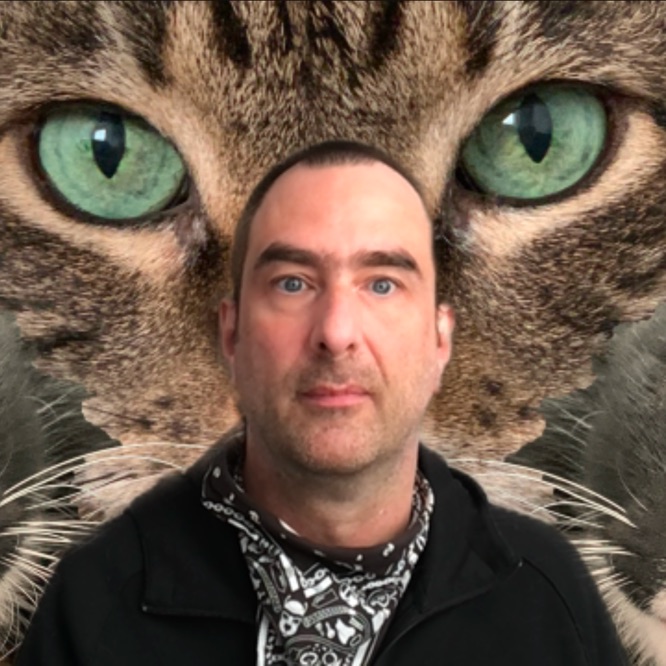
Throughout the pandemic, our late night escapades into the outside hallway provided plenty of opportunity for Esteban to make his routine round down the hallway, around the corner to the passenger elevators, and back again. He clearly enjoyed himself and all along checked for familiar as well as unusual smells. But that wasn’t quite enough and most certainly not the hallway experience of yore. After all, the most important part, the many opportunities for social interaction with other humans, were completely missing. Worse, the one time Esteban found somebody to hang with, it resulted in the Great Chase, with them recoiling from him and fleeing in terror down the hallway. That stung!
After I had found a new position and started spending significant time in video conference calls, Esteban quickly wisened up to that fact. Soon enough, when I went on a call, he’d come over from bed, positioned himself between me and camera, and—like Evita on her balcony—wallowed in the attention of his adoring public. While I have doubts about the depth of my co-workers’ appreciation for his presence, it was enough for him. And that’s all that matters.
I’m very glad he did it too because him sitting still like that provided me with many an opportunity for taking selfies of the two of us. I’m sure you have already admired them throughout this remembrance. It’s amazing how many of them turned out to be just great. I’m so very glad I got to spend those moments with him. While being unemployed, again, is a cause of considerable anxiety, that also gave me the time and freedom to be there with him at the end and to write this remembrance. I’m so very glad for both.
“I’m a friend. Compañero.”—Peter Falk in Wim Wenders’ Wings of Desire
